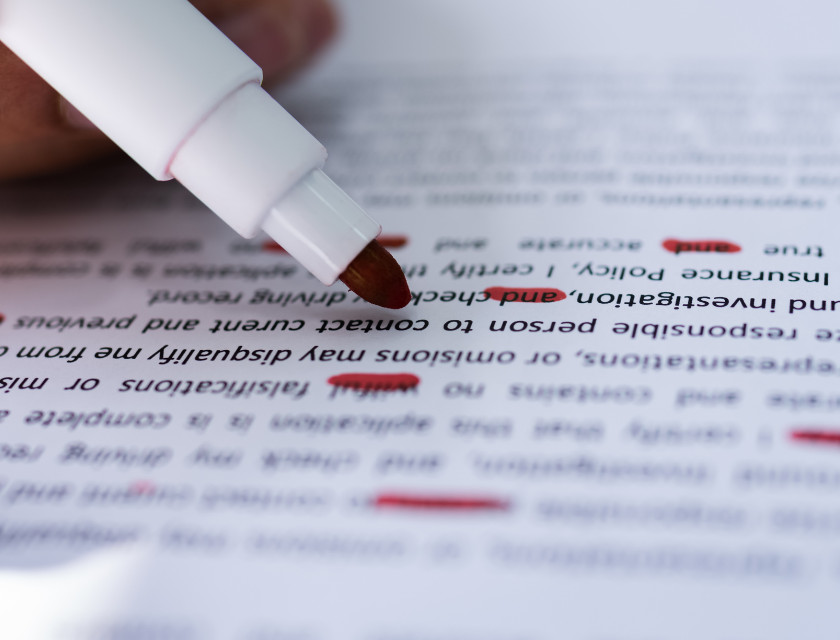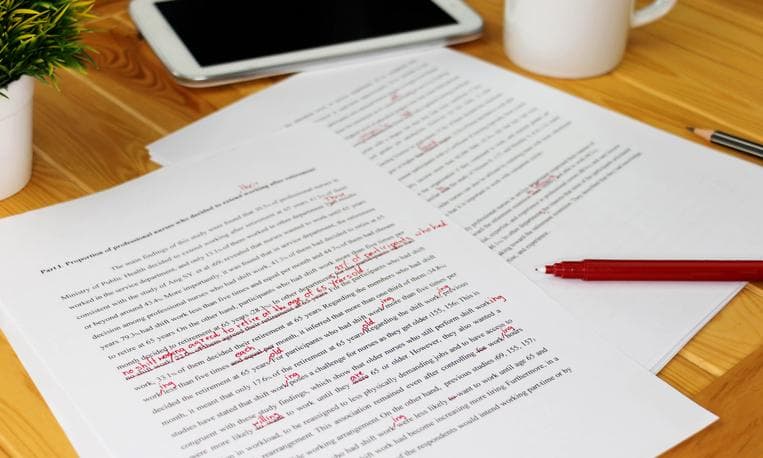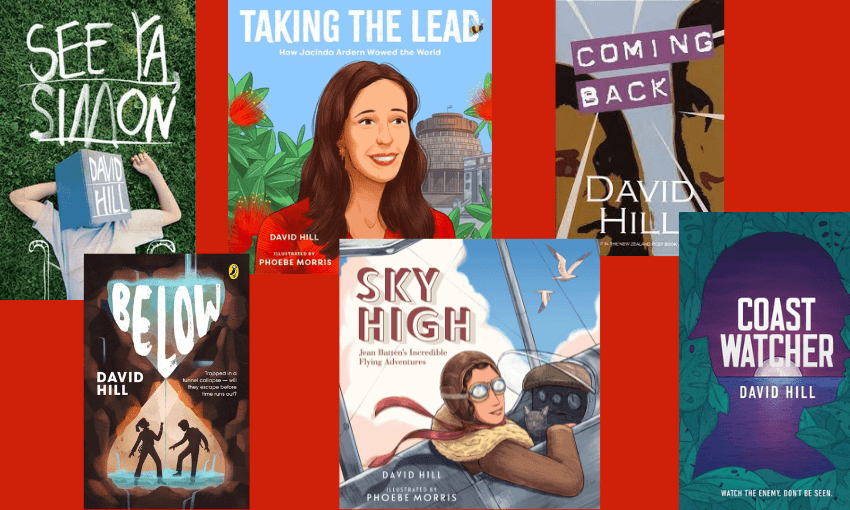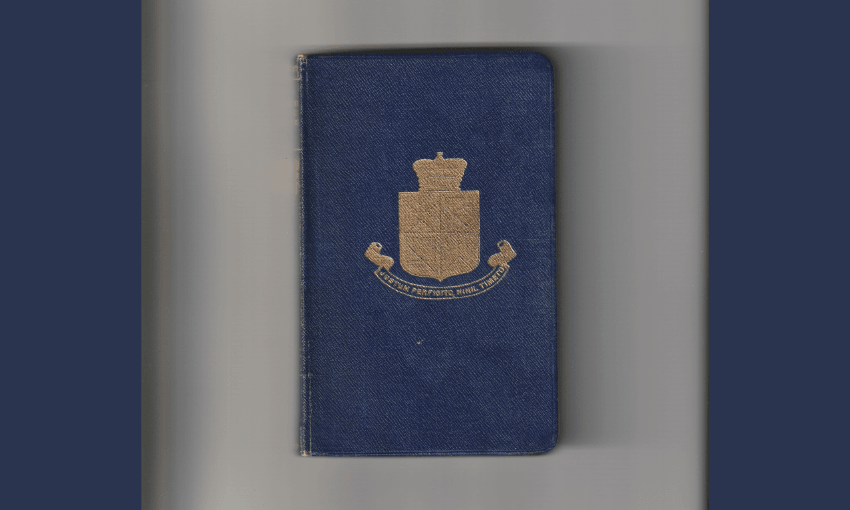
Tips for Online Students , Tips for Students

How To Write An Essay: Beginner Tips And Tricks
Updated: July 11, 2022
Published: June 22, 2021

Many students dread writing essays, but essay writing is an important skill to develop in high school, university, and even into your future career. By learning how to write an essay properly, the process can become more enjoyable and you’ll find you’re better able to organize and articulate your thoughts.
When writing an essay, it’s common to follow a specific pattern, no matter what the topic is. Once you’ve used the pattern a few times and you know how to structure an essay, it will become a lot more simple to apply your knowledge to every essay.
No matter which major you choose, you should know how to craft a good essay. Here, we’ll cover the basics of essay writing, along with some helpful tips to make the writing process go smoothly.

Photo by Laura Chouette on Unsplash
Types of Essays
Think of an essay as a discussion. There are many types of discussions you can have with someone else. You can be describing a story that happened to you, you might explain to them how to do something, or you might even argue about a certain topic.
When it comes to different types of essays, it follows a similar pattern. Like a friendly discussion, each type of essay will come with its own set of expectations or goals.
For example, when arguing with a friend, your goal is to convince them that you’re right. The same goes for an argumentative essay.
Here are a few of the main essay types you can expect to come across during your time in school:
Narrative Essay
This type of essay is almost like telling a story, not in the traditional sense with dialogue and characters, but as if you’re writing out an event or series of events to relay information to the reader.
Persuasive Essay
Here, your goal is to persuade the reader about your views on a specific topic.
Descriptive Essay
This is the kind of essay where you go into a lot more specific details describing a topic such as a place or an event.
Argumentative Essay
In this essay, you’re choosing a stance on a topic, usually controversial, and your goal is to present evidence that proves your point is correct.
Expository Essay
Your purpose with this type of essay is to tell the reader how to complete a specific process, often including a step-by-step guide or something similar.
Compare and Contrast Essay
You might have done this in school with two different books or characters, but the ultimate goal is to draw similarities and differences between any two given subjects.
The Main Stages of Essay Writing
When it comes to writing an essay, many students think the only stage is getting all your ideas down on paper and submitting your work. However, that’s not quite the case.
There are three main stages of writing an essay, each one with its own purpose. Of course, writing the essay itself is the most substantial part, but the other two stages are equally as important.
So, what are these three stages of essay writing? They are:
Preparation
Before you even write one word, it’s important to prepare the content and structure of your essay. If a topic wasn’t assigned to you, then the first thing you should do is settle on a topic. Next, you want to conduct your research on that topic and create a detailed outline based on your research. The preparation stage will make writing your essay that much easier since, with your outline and research, you should already have the skeleton of your essay.
Writing is the most time-consuming stage. In this stage, you will write out all your thoughts and ideas and craft your essay based on your outline. You’ll work on developing your ideas and fleshing them out throughout the introduction, body, and conclusion (more on these soon).
In the final stage, you’ll go over your essay and check for a few things. First, you’ll check if your essay is cohesive, if all the points make sense and are related to your topic, and that your facts are cited and backed up. You can also check for typos, grammar and punctuation mistakes, and formatting errors.
The Five-Paragraph Essay
We mentioned earlier that essay writing follows a specific structure, and for the most part in academic or college essays , the five-paragraph essay is the generally accepted structure you’ll be expected to use.
The five-paragraph essay is broken down into one introduction paragraph, three body paragraphs, and a closing paragraph. However, that doesn’t always mean that an essay is written strictly in five paragraphs, but rather that this structure can be used loosely and the three body paragraphs might become three sections instead.
Let’s take a closer look at each section and what it entails.
Introduction
As the name implies, the purpose of your introduction paragraph is to introduce your idea. A good introduction begins with a “hook,” something that grabs your reader’s attention and makes them excited to read more.
Another key tenant of an introduction is a thesis statement, which usually comes towards the end of the introduction itself. Your thesis statement should be a phrase that explains your argument, position, or central idea that you plan on developing throughout the essay.
You can also include a short outline of what to expect in your introduction, including bringing up brief points that you plan on explaining more later on in the body paragraphs.
Here is where most of your essay happens. The body paragraphs are where you develop your ideas and bring up all the points related to your main topic.
In general, you’re meant to have three body paragraphs, or sections, and each one should bring up a different point. Think of it as bringing up evidence. Each paragraph is a different piece of evidence, and when the three pieces are taken together, it backs up your main point — your thesis statement — really well.
That being said, you still want each body paragraph to be tied together in some way so that the essay flows. The points should be distinct enough, but they should relate to each other, and definitely to your thesis statement. Each body paragraph works to advance your point, so when crafting your essay, it’s important to keep this in mind so that you avoid going off-track or writing things that are off-topic.
Many students aren’t sure how to write a conclusion for an essay and tend to see their conclusion as an afterthought, but this section is just as important as the rest of your work.
You shouldn’t be presenting any new ideas in your conclusion, but you should summarize your main points and show how they back up your thesis statement.
Essentially, the conclusion is similar in structure and content to the introduction, but instead of introducing your essay, it should be wrapping up the main thoughts and presenting them to the reader as a singular closed argument.

Photo by AMIT RANJAN on Unsplash
Steps to Writing an Essay
Now that you have a better idea of an essay’s structure and all the elements that go into it, you might be wondering what the different steps are to actually write your essay.
Don’t worry, we’ve got you covered. Instead of going in blind, follow these steps on how to write your essay from start to finish.
Understand Your Assignment
When writing an essay for an assignment, the first critical step is to make sure you’ve read through your assignment carefully and understand it thoroughly. You want to check what type of essay is required, that you understand the topic, and that you pay attention to any formatting or structural requirements. You don’t want to lose marks just because you didn’t read the assignment carefully.
Research Your Topic
Once you understand your assignment, it’s time to do some research. In this step, you should start looking at different sources to get ideas for what points you want to bring up throughout your essay.
Search online or head to the library and get as many resources as possible. You don’t need to use them all, but it’s good to start with a lot and then narrow down your sources as you become more certain of your essay’s direction.
Start Brainstorming
After research comes the brainstorming. There are a lot of different ways to start the brainstorming process . Here are a few you might find helpful:
- Think about what you found during your research that interested you the most
- Jot down all your ideas, even if they’re not yet fully formed
- Create word clouds or maps for similar terms or ideas that come up so you can group them together based on their similarities
- Try freewriting to get all your ideas out before arranging them
Create a Thesis
This is often the most tricky part of the whole process since you want to create a thesis that’s strong and that you’re about to develop throughout the entire essay. Therefore, you want to choose a thesis statement that’s broad enough that you’ll have enough to say about it, but not so broad that you can’t be precise.
Write Your Outline
Armed with your research, brainstorming sessions, and your thesis statement, the next step is to write an outline.
In the outline, you’ll want to put your thesis statement at the beginning and start creating the basic skeleton of how you want your essay to look.
A good way to tackle an essay is to use topic sentences . A topic sentence is like a mini-thesis statement that is usually the first sentence of a new paragraph. This sentence introduces the main idea that will be detailed throughout the paragraph.
If you create an outline with the topic sentences for your body paragraphs and then a few points of what you want to discuss, you’ll already have a strong starting point when it comes time to sit down and write. This brings us to our next step…
Write a First Draft
The first time you write your entire essay doesn’t need to be perfect, but you do need to get everything on the page so that you’re able to then write a second draft or review it afterward.
Everyone’s writing process is different. Some students like to write their essay in the standard order of intro, body, and conclusion, while others prefer to start with the “meat” of the essay and tackle the body, and then fill in the other sections afterward.
Make sure your essay follows your outline and that everything relates to your thesis statement and your points are backed up by the research you did.
Revise, Edit, and Proofread
The revision process is one of the three main stages of writing an essay, yet many people skip this step thinking their work is done after the first draft is complete.
However, proofreading, reviewing, and making edits on your essay can spell the difference between a B paper and an A.
After writing the first draft, try and set your essay aside for a few hours or even a day or two, and then come back to it with fresh eyes to review it. You might find mistakes or inconsistencies you missed or better ways to formulate your arguments.
Add the Finishing Touches
Finally, you’ll want to make sure everything that’s required is in your essay. Review your assignment again and see if all the requirements are there, such as formatting rules, citations, quotes, etc.
Go over the order of your paragraphs and make sure everything makes sense, flows well, and uses the same writing style .
Once everything is checked and all the last touches are added, give your essay a final read through just to ensure it’s as you want it before handing it in.
A good way to do this is to read your essay out loud since you’ll be able to hear if there are any mistakes or inaccuracies.
Essay Writing Tips
With the steps outlined above, you should be able to craft a great essay. Still, there are some other handy tips we’d recommend just to ensure that the essay writing process goes as smoothly as possible.
- Start your essay early. This is the first tip for a reason. It’s one of the most important things you can do to write a good essay. If you start it the night before, then you won’t have enough time to research, brainstorm, and outline — and you surely won’t have enough time to review.
- Don’t try and write it in one sitting. It’s ok if you need to take breaks or write it over a few days. It’s better to write it in multiple sittings so that you have a fresh mind each time and you’re able to focus.
- Always keep the essay question in mind. If you’re given an assigned question, then you should always keep it handy when writing your essay to make sure you’re always working to answer the question.
- Use transitions between paragraphs. In order to improve the readability of your essay, try and make clear transitions between paragraphs. This means trying to relate the end of one paragraph to the beginning of the next one so the shift doesn’t seem random.
- Integrate your research thoughtfully. Add in citations or quotes from your research materials to back up your thesis and main points. This will show that you did the research and that your thesis is backed up by it.
Wrapping Up
Writing an essay doesn’t need to be daunting if you know how to approach it. Using our essay writing steps and tips, you’ll have better knowledge on how to write an essay and you’ll be able to apply it to your next assignment. Once you do this a few times, it will become more natural to you and the essay writing process will become quicker and easier.
If you still need assistance with your essay, check with a student advisor to see if they offer help with writing. At University of the People(UoPeople), we always want our students to succeed, so our student advisors are ready to help with writing skills when necessary.
Related Articles

How to Write Better Essays
9 College Essay Tips on How to Write Better Essays
Want to learn how to write better essays? We’re here to help. In this guide, we have collected the best college essay tips from our experienced team, who have guided hundreds of students through the college admissions process. Our experts have taught many students how to write better essays, helping them gain admission to some of the most competitive schools in the country.
This guide will teach you how to write better essays and provide you with 9 college essay tips to keep in mind as you write your supplemental essays and personal statements. Our admissions experts have extensive experience with college essay prompts and the college application essay format. They’ve guided hundreds of students through how to write better essays.
In addition to our college essay tips, this guide will provide insight into college essay prompts, supplemental essays, and other tips on how to write better essays overall. We’ll go over the different essay prompts you may encounter and offer some tips on tackling common essays. This guide will also detail how to use essay examples to help with your writing process. We’ll also offer tips on how to help your essays stand out. If you’re looking for college essay help, continue reading below.
College Application Requirements

While the college essay is a major part of the college admissions process, it’s not the only element to consider. Many college application requirements include transcripts, extracurriculars, recommendations, as well as supplemental essays. You may also need to submit a college resume and a separate personal statement in addition to your Common App essay . It’s important to pay attention to the college application deadlines as well. Different schools will have different college application requirements, including different college essay prompts.
Your grades and extracurricular activities can provide colleges with a great overview of your school performance. However, the best college admissions essays give schools a deeper understanding of your identity and goals. College essay prompts are designed to help admissions officers decide who may be a good fit for their campus. Many college essay tips will focus on showcasing your personality and highlighting aspects of your high school career that colleges may not know about. If you’re looking to learn how to write better essays, we’ve detailed the kinds of college essay prompts you may encounter below.
Common App essay vs. supplemental essays
Through the college admissions process, you will encounter both the Common App essay and supplemental essays. The Common App essay , sometimes known as a personal statement, has a 650-word limit. Students have a choice between seven college essay prompts, and they can send the Common App essay to multiple schools. The college application essay format allows students to highlight a personal interest, accomplishment, or important story. The best college admission essays leave a great impression on the reader and make them feel as if they know the author in a personal way. Researching college essay tips and college essay ideas can help you learn how to write better essays.
In addition to the Common App essay, you will also encounter supplemental essays. Supplemental essays are typically shorter than the Common App essay, often between 150-300 words. Supplemental essays are school specific, and are designed to see how much you know about the school you’re applying to. In the next section, we’ll detail the different kinds of supplemental essays you may encounter. We’ll also give you some college essay tips to help you learn how to write better essays.
What is a supplemental essay?

Supplemental essays are essays assigned specifically by a school. While the college application essay prompts may be similar, it’s important to make sure each essay is unique for each school. The supplemental essay allows schools to get more information about you and your interests outside of your Common App essay and overall college application. Not all schools will have supplemental essays, but it’s important to allot time to write these additional essays. Some schools will have 2-3 additional essay prompts, which could mean a lot of extra writing if you aren’t prepared.
There are many different kinds of supplemental essays. Some schools have very short essay prompts, such as Columbia . These may ask students to list influential books, movies, and ways they explore their interests. Other schools ask for additional personal statements in addition to the Common App essay, such as Harvard. Some schools will list the supplemental essays as optional, such as the Fordham supplemental essays. CollegeAdvisor recommends students complete every supplemental essay for each school on their college list . This includes all “optional” college essay prompts.
Here are some college essay tips for some of the most common supplemental college essay prompts. These college essay topics are found at many colleges, and it’s likely that you will encounter them at some point through the admissions process. Reading these tips can help you when pondering what to write your college essays about . These tips can help you learn how to write better essays and help brainstorm some college essay ideas:
Tips to Write Better Essays

1. Why School Essay
The Why School essay is one of the most common college essay prompts. This essay asks you to explain why you’re interested in that specific school. As you tackle these college essay prompts, make sure to pinpoint your exact reasons for applying.
2. Why Major Essay
The Why Major Essay is designed to help schools understand why you’re interested in your intended major. Try to explain your interest, and how that school will help you with your goals—see the UPenn supplemental essays for an example.
3. Cultural Diversity Essay
Many schools use the Cultural Diversity Essay to get to know your background better or allow you to highlight important aspects of your identity. The Tufts supplemental essays include a Cultural Diversity Essay. This prompt asks students to explain how their background has shaped who they are.
4. Personal Challenge Essay
The Personal Challenge Essay allows students to describe an obstacle they have overcome. Many of the best college essays highlight a student’s personal struggle, but it can be challenging to not overshare . Be sure to read college essay examples to help you strike the right balance.
5. Extracurricular Activities Essay
The Extracurricular Activities Essay allows you to elaborate on your college resume. It offers you an opportunity to discuss your favorite club, sport, or community project. The Yale supplemental essays include an Extracurricular Activities Essay, asking students to reflect on how they have worked to enrich their community.
6. Unique or Oddball College Essays
Some colleges are known for their unique essay prompts, such as the University of Chicago . These college essay prompts require students to get creative, and some of the best college admission essays come from a unique or oddball prompt. While these prompts may be intimidating, they can be a great opportunity for you to flex some creative muscles. They can also be a lot of fun to write, so don’t shy away from them!
7. Short Essays
Short college application essay prompts can be some of the more challenging essays to write. Learning how to write better essays can help you with the short essay prompts, as you need to be concise and thoughtful about what you include. Every word will matter in a short essay prompt. So, think carefully about what you want to say and how you will say it. This will help you write the best college admission essays possible.
You may encounter a number of different supplemental essays, but all of them have the same goal—to help admissions officers learn more about you and your goals. If you’re still feeling stuck on your essays, U.S News has a great guide on How to Write a Supplemental Essay . Harvard also has great essay writing resources, including 12 Strategies to Writing the Perfect College Essay and student perspectives on the college essay. Vanderbilt has also compiled some essay writing tips, and the Smith College essay tip sheet can also come in handy.
Do colleges care about supplemental essays?
While it’s hard to say exactly how supplemental essays factor into the admissions process, we do know that colleges care about your essays. The supplemental essay is the best opportunity for you to speak directly to the colleges you’re applying to. As such, it can serve as a great way for admissions officers to get to know you better. While college essay topics can feel silly or repetitive, it’s important to dedicate time and effort to your essays.
One of the more common college essay mistakes is re-using the same essay for multiple colleges. While you can strategically re-use sentences and phrases, it’s important to make sure that each essay is unique to each college. Colleges want to ensure that the students they admit are passionate about their campus, and the best college essays effectively communicate that passion. The common college essay topics are designed to help admissions officers learn more about you, so it’s crucial to take them seriously.
Case Study: Ivy League Essays

Let’s think about two hypothetical students, Lisa and Leo. They both have similar SAT scores, GPAs, and strong recommendation letters. They both were heavily involved in extracurriculars and met the admissions criteria for many Ivy League universities . Lisa wanted to learn how to write better essays, while Leo assumed the essays wouldn’t weigh as heavily as the other parts of his application. Lisa started to research college essay tips, read college essay examples , and familiarized herself with the college application essay format. She made sure to read different articles on how to write better essays, such as this one by U.S. News and Forbes’ The Perfectionist’s Guide to the College Essay .
Leo wasn’t too concerned about college essay tips or learning how to write better essays. He did not seek college essay help and turned in the same Why Major essay to many of his top choices. While Lisa took care to make sure each of her college application essay prompts was unique and varied between each school, Leo assumed nobody would read the essays. Come Decision Day, it’s no surprise that Lisa was accepted to her top choice, and Leo was waitlisted.
You can see why Lisa would have an advantage over Leo—taking enough time and effort to learn how to write better essays can help increase your chances of admission. Developing creative and unique college essay ideas can be a challenge, but it is worth the effort. If you research common college essay tips and read different college essay examples, you’ll be surprised at how quickly you learn how to write better essays.
What makes a great college essay?
With so many resources and college essay tips, it can be hard to determine what makes a great college essay. When learning how to write better essays, it can be helpful to have some guidelines to keep in mind. We’ve collected 5 key components of the best college admission essays to help you learn how to write better essays:
How to Write a Great College Essay

1. Compelling Hook
A compelling hook can be the difference between a good college essay and a great college essay. If you’re wondering how to start a college essay, introducing an interesting personal story or anecdote can be a great way to set up a compelling hook in your first paragraph. Learning how to write better essays will help you develop compelling hooks to help capture the reader’s attention. Part of writing a compelling hook is to land the ending as well, so be sure to finish strong.
2. Personal detail not offered elsewhere in application
The college application essay format is designed to help you highlight details that may not be present elsewhere in your application. The best college admissions essays help add to a student’s application and offer insight that helps create a holistic profile. If you want to learn how to write better essays, then brainstorm details or stories that may be missing from your overall application.
3. Original and engaging topics
While many of the college application essay prompts will be repetitive, it’s important to make sure your essays have original and engaging topics. Think outside the box and try to approach your essays creatively. After all, learning how to write better essays can help you come up with original topics that will help your essays stand out. If you’re feeling stuck, U.S News has 10 Tips to Inspire College Essays to help. You can also read this U.S. News article on common essay topics and what admissions officers think of them.
4. Unique and personal voice
One of the biggest college essay tips is to develop your unique and personal voice. This can be the hardest part about learning how to write better essays. However, it’s crucial in making sure your essays stand out. Your essays should reflect your own voice and help the reader get to know you as an individual. Developing your own writing voice is a great skill that can take significant time and effort. If you’re struggling on developing your voice, Forbes has a great guide you can read here .
5. Grammatically sound and free of errors
It’s common to find college essay mistakes in the first, second, or even third drafts – making the proofreading process crucial. Ensuring that your college essay is free of errors, and follows all applicable grammatical rules, will make a great impression on admissions officers. Learning how to write better essays will help you catch any errors you make. U.S. News has a great guide on Grammar Do’s and Don’t for college essays if you’re concerned about using the proper rules.
Overall, the best way to incorporate these components is to invest a lot of time and effort into your essays. Make sure to ask for college essay help through proofreading, editing, and read-throughs. Having multiple teachers, mentors, and relatives read through your essays will help ensure the best versions are submitted. Learning how to write better essays takes a lot of time and practice, so the earlier you can start, the better.
How do I make my college essay stand out?
With college admissions becoming more and more competitive, it’s important for your college essay to stand out. If you’re interested in learning how to write better essays, we’ve compiled 9 college essay tips to help you. From help on how to start a college essay to breaking down the college application essay format, our college essay tips are designed to help you each step of the way.
Our essay tips are designed for students across all stages of the application process, from freshmen and sophomores looking to get a head start to seniors deep in the application season. If you’re looking for more step-by-step guides, Forbes has a great guide on How to Write A College Essay. You can read it here .
Our 9 college essay tips will help you write standout essays and help capture exactly what you want to communicate to colleges.
9 College Essay Tips
Tackling the essay portion of your college admissions process can be daunting. In this guide on how to write better essays, we have discussed a lot of useful college essay tips including college application requirements, what makes a great college essay, and how you can write the best college essays possible. Now, we’re going to give you some practical college essay tips that will apply to any prompt you’ll encounter.
Only the best college essays will rise to the top, so it’s important to know how to write better essays, especially if you apply to reach schools such as Ivy League universities . When considering how to write better essays, it’s important to look at college essay examples like the Tufts supplemental essays, Fordham supplemental essays, UPenn supplemental essays, and Yale supplemental essays. Additionally, always check out college admissions sites to see if they have specific tips for their essays. For example, here are some tips on the Smith College essay.
With plenty of available resources and college essay tips, like this guide on how to write better essays, you can write the best college admission essays. Our college essay tips come directly from experts who have guided hundreds of students through the college admissions process, like these tips from experts at Vanderbilt . You can also check out our Success Stories , where you can read about real CollegeAdvisor students’ journeys!
Wondering how to start a college essay and how to write better essays? Great! Because we will now discuss 9 college essay tips. These tips will show you how to write better essays that showcase your unique qualities.
#1: Start Early

Wondering how to write better essays? The first thing you need to know is to start early. You might have heard the first of our college essay tips before, but experts agree that you need to give yourself ample time to tackle college essays. This means enough time to develop college essay ideas, complete drafts, and review them multiple times. That way, you can steer clear of any college essay mistakes. This can be tedious, but it is an imperative part of writing the best college admission essays.
U.S. News suggests that students wondering how to write better essays should start writing the summer before senior year. Schools often release their college essay prompts at the end of summer. Ideally, by the fall you will have drafted your personal statement , finalized your college list, and started working on other aspects of the Common App. This ensures you have a solid foundation when college essay prompts are released. Additionally, this will make it less stressful to dive right into the writing process.
Most importantly, starting early gives you plenty of time to write multiple drafts before college application deadlines . These can be as early as October or November for those applying Early Action or Early Decision. Regular Decision deadlines are generally in December or January. So, figure out when you intend to submit your college applications. Then, make a priority list of essays in the order of their due dates.
Planning your essay strategy
In addition to your Common App essay , many colleges ask applicants to submit supplemental essays. These ask students to explain what interests them about a particular school or major. These college essay prompts are generally released in the late summer. They also tend to be shorter than the main essay. So, when budgeting your time, don’t forget about school-specific supplemental essays!
Moreover, starting early gives you ample time to familiarize yourself with college application requirements. You can review the essay requirements for each of the colleges you’re interested in on their websites. There, you will find the college essay prompts, word limits, and other college application essay format guidelines. This guarantees that you are well prepared and write the best college admission essays.
Whether you’re writing the Tufts supplemental essays, Fordham supplemental essays, UPenn supplemental essays, Yale supplemental essays, or responding to the Smith College essay prompts, you’ll need to follow the school-specific guidelines. So, make sure you understand what makes each of these college essay prompts unique.
#2: Practice Writing about Yourself

College essays ask students to be personal and vulnerable in their writing, which may be unfamiliar to them. However, it’s an essential aspect of how to write better essays. Telling personal details about yourself and your goals does not mean simply restating your college resume . But, it also doesn’t mean you should overshare or “trauma dump.”
While you may excel in crafting research reports, personal writing can be challenging. There are a few contexts outside of the college admissions process where you will be asked to write about yourself. This is where the second of our college essay tips on how to write better essays comes into play: practice writing about yourself.
There are various strategies you can use to practice. First, you can begin by writing a daily journal. Inevitably, you will have to write about yourself, your thoughts, and your actions. Next, you can audio record yourself talking and write from that. This will ensure your writing captures who you are and even has a conversational tone. You might also try free-writing. Just set a timer and write until it goes off! The more often you do this, the easier it will get. And, you’re bound to find some meaningful gems among the scribblings.
Targeted essay practice
Another good way to get acclimated to writing about yourself is to look at college application essay prompts from prior years and practice responding to them. These college essay prompts will likely be similar to those in your application cycle. Finally, read college essay examples written by other students to get a feel for how to respond. These exercises are key components when considering how to write better essays.
Reading college essay tips is great, but remember that practice is key. Learning to write about yourself is a vital skill when learning how to write better essays.
#3: Familiarize yourself with the essay prompts

The most common types of supplemental essays and college essay prompts are as follows:
- Why School Essay
- Why Major Essay
- Cultural Diversity Essay
- Personal Challenge Essay
- Extracurricular Activities Essay
- Unique or Oddball College Essays
- Short Essays
College essay prompts generally fall into one of these specific college application essay format categories. So, it’s essential to familiarize yourself with them in advance to know how to write better essays. By reviewing past college essay prompts and college application essay formats, you can practice your responses in order to write the best college admission essays. No matter if you’re writing Tufts supplemental essays, Fordham supplemental essays, UPenn supplemental essays, Yale supplemental essays, or Smith College essays, familiarizing yourself with a wide variety of essays will give you an edge. This will increase your admissions odds at selective schools.
Reading sample college essays
Additionally, to gain a better understanding of what universities look for, it’s beneficial to read through college essay examples of why school essays. Familiarizing yourself with why school college application essay formats will provide insight into the specific aspects of the responses that admissions officers value. So, college essay examples can teach you what to expect from these sorts of college application essay prompts. This is a key component in any student’s “how to write better essays” plan.
Checking out other college application essay formats, such as examples of extracurricular activities college application essay prompts, can help you figure out how to write better essays about your own extracurriculars. Namely, you’ll want to focus on the impact they’ve had on you and, subsequently, your current path to higher education.
When preparing to write your college essays, consider the word limit of the college application essay prompts. This will determine how much or how little you can include in your writing. Sometimes, less is more. And, it’s always best to aim for the suggested word limit.
By following these college essay tips on how to write better essays, you can prepare yourself to tackle college essay prompts and craft outstanding responses. Familiarizing yourself with a variety of prompts will ensure you’re ready for anything when it comes to college essays.
#4: Take time to research

Before you start writing, you should learn more about the schools you are applying to. One of the most important college essay tips on how to write better essays is spending time researching the colleges on your list. This will allow you to uncover specific opportunities that align with your goals. And, you should want to be just as good of a fit for the school as it is for you. Moreover, a key part of how to write better essays is including school-specific details.
However, you should not only research the basic things like the college essay prompts and college application requirements. Instead, you should focus on things that are specific to the school and coincide with your interests. What major are you considering? Why is the campus setting appealing to you? What organizations do you want to get involved in? Are there professors that you’re excited to learn from? Foregrounding these details gives you a chance to prove to the admissions team that you have invested time and energy into finding the best college for you.
Learn all that you can so that you can submit a well-informed and persuasive application. Your essay should show how the college meets your needs and how you plan to contribute to the campus environment.
Make sure to mention any unique aspects of the school or curriculum that could contribute to your overall career goals . The more details you use, the better you will be able to paint a picture of why you belong at that school. Researching the college you are applying to will enable you to gather relevant information about its values and opportunities. Then, you can use the specific details that attract you to the school to write the most impactful essays.
#5: Outline your essays

Outlining your essays is one of the most crucial college essay tips in the “how to write better essays” process. Outlines allow you to organize your thoughts, structure your college essay ideas, and ensure your essays effectively convey the intended message.
Outlines are beneficial because they help you clarify your main points and maintain focus throughout your essay. They enable efficient use of your word limit and aid in college essay ideas development. Additionally, outlines contribute to the overall time management process.
It can be easy to get distracted while writing and go off on a tangent. That’s okay when it comes to free-writing practices. However, when it’s time to write your actual essay, you’ll need to be more focused and intentional with your writing. By creating a solid plan, you will set yourself up for a successful essay writing process.
#6: Never repeat yourself

Supplemental essays provide applicants with an opportunity to provide additional information to the admissions committee, highlighting why they are a strong fit for the school. That’s why the sixth of our college essay tips on how to write better essays is to never repeat yourself . Your essays should be used to expand upon different college essay topics, experiences, and perspectives.
You’ll likely run into a scenario in which the school you are applying to requires two types of supplemental essays. Let’s say you choose to write about similar or adjacent college essay topics for both. For example, you discuss your passion for community service in both essays, elaborating on different aspects within each. While this approach may seem coherent, it’s generally a better choice to write about two entirely different subjects for the essays. Writing about different topics demonstrates that you are a well-rounded applicant and would contribute to various aspects of the college community.
When elaborating on extracurricular activities listed on the Common App, you’ll need to provide additional details and deeper meaning. Be strategic and don’t restate what has already been mentioned. Instead, use this opportunity to dive deeper into specific projects, achievements, leadership roles, and personal growth.
#7: Showcase your voice

Your writing voice is the unique and distinctive style, tone, and personality that comes through in your essays. Think of it as your way of expressing your thoughts and ideas on the page. When writing your college essays, an admissions team should be able to “hear” your voice.
An important element of how to write better essays is writing with an authentic voice . Your college essays should sound like you. So, unless you frequently use Shakespearean language, avoid it in your college essays.
Use these college essay tips as tools to show who you are, what you value, and how you think. By making sure your authentic voice comes through, you can do just that. It’s vital that your essays are an authentic, personal, and vulnerable representation of who you are. Remember, you are what you write .
#8: “Show” don’t “Tell”

You’ve probably heard it before, but #8 on our college essay tips on how to write better essays reaffirms the importance of showing, not telling, in your college essays. Your college essays give you the opportunity to show the admissions team who you are beyond your academic achievements. Entertaining or intriguing anecdotes are more effective at explaining your qualities and passions than just statements.
Think about your most meaningful and favorite life stories. Do they show something about your personality, values, interests, or character? You should use relevant anecdotes in order to show the admissions officers how you embody certain traits or beliefs, as opposed to just stating you have them.
Let’s take a look at this example of “show” vs “tell” writing:
“Tell” Writing: “I am compassionate and want to help others. I have volunteered at a local homeless shelter, which has been very rewarding.”
“Show” Writing: “Last summer, as I was volunteering at the local homeless shelter, I experienced an indescribable sense of fulfillment. I served a tired-looking woman with three young children a hot plate of food. She met me with gratitude and relief in her eyes, and I met her with a warm smile. At that moment, I saw my small act of kindness make a tangible difference in someone’s life and knew that I wanted to pursue a career that would do the same.”
As you can see, the “show” writing example paints a vivid picture and engages the reader by providing specific details and descriptions. This creates a more impactful and memorable narrative while providing evidence of the argument being made: the student is passionate about helping others. If you decide to write about a common topic like service, do it because your experience has led to thought and reflection, not because you feel like it’s what admissions officers want to hear.
If you want to know how to write better essays, whether writing Tufts supplemental essays, Fordham supplemental essays, UPenn supplemental essays, Yale supplemental essays, or Smith College essays, showing and not telling is key. You’ll notice it in all exceptional college essay examples.
#9: Ask for help!

You should approach the editing phase of your college essays with the same importance as the writing phase. This phase is connected to the first of our college essay tips: start early! The earlier you start planning your essays, the more time you’ll have to ask parents, teachers, and advisors for college essay help. Having an outsider look at your essay will teach you a lot. So, make sure you dedicate sufficient time to this critical phase.
When you feel like your essay is ready for review, use multiple resources to increase the chances of producing an error-free essay. Begin with writing assistant programs, like spell-check, for basic errors. Then, ideally, seek college essay help from at least two knowledgeable adults. Their feedback can help when considering how to write better essays. Additionally, look to these tips from Harvard experts and Harvard students on how to write standout college essays.
Give yourself time to receive external feedback on your college essay topics and ideas as well as grammar, punctuation, and spelling. Following these guidelines will help you to complete your college application essays before the application deadline. This will ensure you submit work that impresses admissions officers and is free of college essay mistakes. For perfectionists, this Forbes guide to the college essay may be exactly what you’re looking for.
After reading all these tips, you should now know how to start a college essay. You can always reach out to our advisors at CollegeAdvisor for college essay help by scheduling an appointment here . We also have guides on writing college essays and supplemental essays, as well as examples of college essays that worked. However, when in doubt during your writing process, revisit these tips for a reminder of how to write better essays.
Learning how to write better essays

Many students struggle with figuring out how to write better essays during the college admissions process. They may think they can’t write the best college admission essays or master the college application essay format. However, with the college essay tips listed above and good college essay help, anyone can learn how to write better essays. What makes a great college essay is a combination of practice, revision, and time.
Are you trying to master how to write better essays? Start by giving yourself enough time to work on your college application essay prompts. Many of our college essay tips require time to research, outline, and plan before you even start writing your first draft. The more time you have to revise and fix your college essay mistakes, the better your essay will be.
Following college essay tips is also important because you may not have experience with this kind of writing. College essay prompts and supplemental essays require different skills than essays for your high school classes. For example, teachers often discourage writers from being too personal in academic essays. However, college essay prompts require a great deal of personal information, and the best essays include authentic personal experiences.
When learning how to write better essays, you can always learn from past successes. Reading essays that worked is a very popular way to gain insight into the college application essay format. Moreover, they may provide inspiration for your own essays, of which there will likely be several. Many colleges ask for multiple supplemental essays, so reading widely will prepare you for the endless college essay prompts available.
Approaching Different Types of Essays
In truth, your understanding of how to write better essays for college will only deepen with practice. In other words, writing for various college essay prompts will improve your final product. Of course, reading sample essays for a variety of topics beforehand will widen your perspective and prepare you to write. With that said, you do actually have to write something—put all those tips and knowledge to good use.
Each essay will demand something different from you: extracurricular experiences, academic aspirations, and challenges faced. While the end goal remains to showcase your best sides to admissions, it can be challenging depending on the prompt. By reading and writing multiple genres of essays, you’ll figure out the best approach to any prompt.
Nowadays, there are many different college essay topics to choose from; some will be better suited to you than others. Knowing what prompts will bring out the best side of you is essential to writing great essays. And don’t worry too much about writing about a never-before-seen or wholly unique experience. Despite what some may say, common topics aren’t off-limits—you just need to fine-tune them to showcase your strengths.
Writing within a short word count is another difficult aspect of how to write better essays. Most academic essays are several pages in length, whereas some college application essay prompts allow fewer than 150 words. Short essays especially require careful word choice and, often, more than one revision. The best college essays are highly polished, refined college essay ideas—basically, start early to get ahead.
Reading College Essay Examples

One of the best ways to learn how to write better essays is to read successful college essay examples. Many college websites will post essay examples from their most recent incoming class. In these, you can see what admitted students wrote about and get some college essay ideas of your own.
With that said, beware of plagiarism. You should never copy supplemental essays that were written by somebody else. Not only is it considered plagiarism, but it also will not help you answer the college essay prompts better. Developing your authentic voice, with some inspiration gained from research, is the best technique for how to write better essays.
If you’re looking for examples for a wide range of college essay prompts, CollegeAdvisor.com has you covered there, too. We’ve compiled some of the best college essays, all written by students like you who were accepted into top colleges. These sample essays and their accompanying college essay tips are excellent models for learning how to write better essays.
Another place to find great college essay help is this article featuring 10 different essays that earned their writers’ acceptance at the end of the admissions process. This article features every possible college application essay format, including Common Application essays and different variations of supplemental essays. Regardless of your college essay prompts, you can find college essay tips for how to write better essays. Unconventional college essay topics are particularly difficult to brainstorm for, so these examples can help you figure out how to start a college essay.
More Essay Guides from CollegeAdvisor
At CollegeAdvisor.com, we know the value of looking over a variety of successful college essay examples. That’s why we’ve compiled essay guides covering the college essay prompts for over 100 of America’s top universities. From the UPenn supplemental essays to the Yale supplemental essays and Tufts supplemental essays, our guides will help you prepare for any college’s prompts.
Because each school’s essays are different, specific essay guides are an excellent place to start. If you’re seeking college essay tips for supplemental essays at a particular school, the best source is successful essays. Our articles also include guides on how to write better essays for Ivy League schools , the UC system , and much more.
What about college essay tips for non-specific essays? While each school’s supplemental essays are different, nearly all of them require some sort of personal statement . This may be through the Common Application , Coalition Application , or an alternative college application essay format. Certainly, there are many articles out there with general college essay tips, like those from U.S. News or Forbes . However, there is no better way to learn how to write better essays than reading full examples.
Use your network
Finally, don’t be afraid to consult your personal network for college essay tips. Do you have a friend, older sibling, or high school alum who attends a college on your list? You can ask them about their essay or about their experience at the school. If you live nearby, you may even be able to accompany them there to walk around campus.
Their perspective could be very valuable since they’ve already gone through the admissions process and been accepted there. Their insights into your personality can also help you consider which college essay prompts will best serve you. When looking into how to write better essays, make sure you take advantage of all the resources available to you.
Making your supplemental essays stand out
We’ve gone over a lot of advice for how to write better essays. By now, your head may be swimming with all the college essay tips and topics we provided. So let’s get back to basics and figure out the most essential things to writing great essays.
To summarize, we wanted to highlight three more college essay tips to help your supplemental essays stand out from the crowd . And, especially if you’re applying to popular schools, there will be a big crowd.
Depending on a school’s size, an admissions officer may read hundreds or thousands of applications during the college admissions process. And because college application requirements are the same for every applicant, they’re likely reading hundreds of responses to the same college essay prompts. Therefore, making your essay stand out is a great way to make a positive first impression on your application.
How to Write a Standout Essay

1. Prepare with Research
The first of our additional college essay tips is to do your research. Supplemental essays often ask students why they want to attend the school or explain how they embody the school’s values. In order to write supplemental essays on these topics, you should know what makes the school appealing to you. Consider a virtual or in-person campus tour, and definitely visit the school website. This research will provide a solid foundation for your essays. Detailed, passionate college essays whose writers did their research stand out among generic essays with only surface-level knowledge of the school. So, write about what moves you, and show that you’ve thought about pursuing those passions at that school.
2. Be Genuine
The second tip for how to write better essays is to be authentic. One of the most common college essay mistakes is writing what you think the admissions officers want to hear . Instead, use the essay as an opportunity to showcase your personality and character.
Don’t just list your accomplishments or try to cram every single accolade you’ve received into an essay. Rather, pick out some personal stories to share that answer the prompt while also providing information about you. The best college admission essays showcase qualities and tell stories not found elsewhere in your application.
3. Don’t Skimp on Time
Finally, anyone who knows how to write better essays knows that time management is paramount. These college essay tips are incredibly useful only if you allow yourself enough time to implement them, so start early! The Common Application opens on August 1st each year, but that doesn’t mean you can’t get a head start. Take some time to think about which topics are best for you, or research supplemental essays from your preferred colleges. The earlier you start, the better off you will be.
An early start means more time to edit—after all, the best college admissions essays go through several rounds of revision. Good editing requires time and patience, which is why starting on your essays early is essential. Taking the time to try several college essay ideas and choose the best ones will ensure that you submit your best work. You also need time to rest. Sometimes, learning how to write better essays means taking a few days’ break, then coming back to writing with fresh eyes!
Starting early also gives you more time to write multiple essay drafts and share them with people for feedback. In addition to giving yourself enough time, it is important to ask for help with how to write better essays. Even if you consider yourself to be a strong writer, college application essays require very specific skills. Support during the admissions process can come from family members, friends, and teachers and will take many forms. Just make sure that your editors are not writing the essay for you or making changes that undermine your own voice.
CollegeAdvisor is here to help
We have already established that the best college admission essays are written with lots of help and support from others. Personalized guidance is important when learning how to write better essays. An expert can often help you put these college essay tips into practice with your own writing. After all, the college application essay format is pretty different from other forms of writing you’re likely used to. In light of that, it helps to work with someone familiar with college essay topics and college application essay prompts.
College admissions can be extremely stressful. The sheer number of college application requirements that need to be completed for each school is daunting, even if you are a strong student. Plus, the skills and knowledge required for a college application are different from the ones high school classes call for. So, if you’re struggling with how to write better essays, know that you’re not alone. There are many resources available to help you.
Those resources include CollegeAdvisor.com. In addition to our numerous free articles, we offer personalized admissions help to hundreds of students worldwide. If you’re trying to write your best college admission essays, we can lend a hand.
Getting Help from CollegeAdvisor
At CollegeAdvisor.com, our team of 400+ Admissions Experts and former Admissions Officers has helped hundreds of students approach the college admissions process with confidence. Whether you need help with how to start a college essay or already have a draft, our experts can help you create the best college application essays possible! We offer one-on-one guidance to students as they complete every aspect of their college applications, including essays. We’ll help you brainstorm topics, create drafts, edit your writing, and more so that you feel confident when you press “submit.”
In addition to your personal college advisor, we also have a dedicated Essay Editing Team whose job is helping students with how to write better essays. They work with your college advisor to provide additional college essay help. This team of specialists will receive your essay and return it within 48 hours with targeted feedback and guidance on how to write better essays. Plus, you can keep sending drafts as you revise so that the feedback you receive will evolve as your essay does.
Finally, where applicable, CollegeAdvisor offers students the chance to have an “application dress rehearsal.” Here, your full application, including essays, is reviewed by one of our former Admissions Officers. They will review the college application essay format with you, check your materials, and flag any issues they see with the application.
They’ll also provide specific feedback based on their experience in admissions offices at the top universities nationwide. They know how admissions officers think and will use that knowledge to help you with how to write better essays. In addition, these former admissions officers will help you prepare for interviews if your school requires them.
College Essay Tips – Final Thoughts
When it comes to college essay prompts, there are many different approaches for how to write better essays. Different college essay prompts will require different techniques. For example, the Fordham supplemental essays may require different skills and perspectives than the Smith college essay. However, the college essay tips we’ve compiled here can be used with a wide range of college application essay prompts. These tips for how to write better essays come from experts in the field with years of admissions experience.
Don’t be afraid to share essays with your advisor, a trusted teacher, or a family member for additional college essay help. They may be able to see errors that you missed and provide a new perspective on your writing. At the same time, since they know your personality, they can tell you if your writing is representative of your potential. In addition, seeking support from a CollegeAdvisor.com expert can give you the added confidence that the advice you are receiving is backed by years of experience.
Experts you can trust
Our experts can help you not only with how to write better essays but also with any other part of your college application requirements. Supplemental essays and college essay prompts are just one part of the admissions process where our advisors can assist you. We also offer help with financial aid, college list development, test prep, and much more.
To see all the ways that CollegeAdvisor.com can help you with your college applications, sign up here for a quick consultation with one of our experts. For even more free resources and examples of college application essays explore our site. For starters, check out this article about the Common Application essay prompts and this one for essay topic ideas.

This article was written by senior advisor, Jess Klein , Bailey Bennett, and senior advisor, Alex Baggott-Rowe . Looking for more admissions support? Click here to schedule a free meeting with one of our Admissions Specialists. During your meeting, our team will discuss your profile and help you find targeted ways to increase your admissions odds at top schools. We’ll also answer any questions and discuss how CollegeAdvisor.com can support you in the college application process.
Personalized and effective college advising for high school students.
- Advisor Application
- Popular Colleges
- Privacy Policy and Cookie Notice
- Student Login
- California Privacy Notice
- Terms and Conditions
- Your Privacy Choices
By using the College Advisor site and/or working with College Advisor, you agree to our updated Terms and Conditions and Privacy Policy , including an arbitration clause that covers any disputes relating to our policies and your use of our products and services.
- Tips for Reading an Assignment Prompt
- Asking Analytical Questions
- Introductions
- What Do Introductions Across the Disciplines Have in Common?
- Anatomy of a Body Paragraph
- Transitions
- Tips for Organizing Your Essay
- Counterargument
- Conclusions
- Strategies for Essay Writing: Downloadable PDFs
- Brief Guides to Writing in the Disciplines
Ultimate Guide to Writing Your College Essay
Tips for writing an effective college essay.
College admissions essays are an important part of your college application and gives you the chance to show colleges and universities your character and experiences. This guide will give you tips to write an effective college essay.
Want free help with your college essay?
UPchieve connects you with knowledgeable and friendly college advisors—online, 24/7, and completely free. Get 1:1 help brainstorming topics, outlining your essay, revising a draft, or editing grammar.
Writing a strong college admissions essay
Learn about the elements of a solid admissions essay.
Avoiding common admissions essay mistakes
Learn some of the most common mistakes made on college essays
Brainstorming tips for your college essay
Stuck on what to write your college essay about? Here are some exercises to help you get started.
How formal should the tone of your college essay be?
Learn how formal your college essay should be and get tips on how to bring out your natural voice.
Taking your college essay to the next level
Hear an admissions expert discuss the appropriate level of depth necessary in your college essay.
Student Stories
Student Story: Admissions essay about a formative experience
Get the perspective of a current college student on how he approached the admissions essay.
Student Story: Admissions essay about personal identity
Get the perspective of a current college student on how she approached the admissions essay.
Student Story: Admissions essay about community impact
Student story: admissions essay about a past mistake, how to write a college application essay, tips for writing an effective application essay, sample college essay 1 with feedback, sample college essay 2 with feedback.
This content is licensed by Khan Academy and is available for free at www.khanacademy.org.
If you're seeing this message, it means we're having trouble loading external resources on our website.
If you're behind a web filter, please make sure that the domains *.kastatic.org and *.kasandbox.org are unblocked.
To log in and use all the features of Khan Academy, please enable JavaScript in your browser.
College admissions
Course: college admissions > unit 4.
- Writing a strong college admissions essay
- Avoiding common admissions essay mistakes
- Brainstorming tips for your college essay
- How formal should the tone of your college essay be?
- Taking your college essay to the next level
- Sample essay 1 with admissions feedback
- Sample essay 2 with admissions feedback
- Student story: Admissions essay about a formative experience
- Student story: Admissions essay about personal identity
- Student story: Admissions essay about community impact
- Student story: Admissions essay about a past mistake
- Student story: Admissions essay about a meaningful poem
Writing tips and techniques for your college essay
Pose a question the reader wants answered, don't focus exclusively on the past, experiment with the unexpected, don't summarize, want to join the conversation.
- Upvote Button navigates to signup page
- Downvote Button navigates to signup page
- Flag Button navigates to signup page


- SUGGESTED TOPICS
- The Magazine
- Newsletters
- Managing Yourself
- Managing Teams
- Work-life Balance
- The Big Idea
- Data & Visuals
- Reading Lists
- Case Selections
- HBR Learning
- Topic Feeds
- Account Settings
- Email Preferences
A (Very) Simple Way to Improve Your Writing
- Mark Rennella

It’s called the “one-idea rule” — and any level of writer can use it.
The “one idea” rule is a simple concept that can help you sharpen your writing, persuade others by presenting your argument in a clear, concise, and engaging way. What exactly does the rule say?
- Every component of a successful piece of writing should express only one idea.
- In persuasive writing, your “one idea” is often the argument or belief you are presenting to the reader. Once you identify what that argument is, the “one-idea rule” can help you develop, revise, and connect the various components of your writing.
- For instance, let’s say you’re writing an essay. There are three components you will be working with throughout your piece: the title, the paragraphs, and the sentences.
- Each of these parts should be dedicated to just one idea. The ideas are not identical, of course, but they’re all related. If done correctly, the smaller ideas (in sentences) all build (in paragraphs) to support the main point (suggested in the title).
Where your work meets your life. See more from Ascend here .
Most advice about writing looks like a long laundry list of “do’s and don’ts.” These lists can be helpful from time to time, but they’re hard to remember … and, therefore, hard to depend on when you’re having trouble putting your thoughts to paper. During my time in academia, teaching composition at the undergraduate and graduate levels, I saw many people struggle with this.
- MR Mark Rennella is Associate Editor at HBP and has published two books, Entrepreneurs, Managers, and Leaders and The Boston Cosmopolitans .
Partner Center
Would you like to explore a topic?
- LEARNING OUTSIDE OF SCHOOL
Or read some of our popular articles?
Free downloadable english gcse past papers with mark scheme.
- 19 May 2022
How Will GCSE Grade Boundaries Affect My Child’s Results?
- Akshat Biyani
- 13 December 2021
The Best Free Homeschooling Resources UK Parents Need to Start Using Today
- Joseph McCrossan
- 18 February 2022
How to Write the Perfect Essay: A Step-By-Step Guide for Students
- June 2, 2022

- What is an essay?
What makes a good essay?
Typical essay structure, 7 steps to writing a good essay, a step-by-step guide to writing a good essay.
Whether you are gearing up for your GCSE coursework submissions or looking to brush up on your A-level writing skills, we have the perfect essay-writing guide for you. 💯
Staring at a blank page before writing an essay can feel a little daunting . Where do you start? What should your introduction say? And how should you structure your arguments? They are all fair questions and we have the answers! Take the stress out of essay writing with this step-by-step guide – you’ll be typing away in no time. 👩💻

What is an essay?
Generally speaking, an essay designates a literary work in which the author defends a point of view or a personal conviction, using logical arguments and literary devices in order to inform and convince the reader.
So – although essays can be broadly split into four categories: argumentative, expository, narrative, and descriptive – an essay can simply be described as a focused piece of writing designed to inform or persuade. 🤔
The purpose of an essay is to present a coherent argument in response to a stimulus or question and to persuade the reader that your position is credible, believable and reasonable. 👌
So, a ‘good’ essay relies on a confident writing style – it’s clear, well-substantiated, focussed, explanatory and descriptive . The structure follows a logical progression and above all, the body of the essay clearly correlates to the tile – answering the question where one has been posed.
But, how do you go about making sure that you tick all these boxes and keep within a specified word count? Read on for the answer as well as an example essay structure to follow and a handy step-by-step guide to writing the perfect essay – hooray. 🙌
Sometimes, it is helpful to think about your essay like it is a well-balanced argument or a speech – it needs to have a logical structure, with all your points coming together to answer the question in a coherent manner. ⚖️
Of course, essays can vary significantly in length but besides that, they all follow a fairly strict pattern or structure made up of three sections. Lean into this predictability because it will keep you on track and help you make your point clearly. Let’s take a look at the typical essay structure:
#1 Introduction
Start your introduction with the central claim of your essay. Let the reader know exactly what you intend to say with this essay. Communicate what you’re going to argue, and in what order. The final part of your introduction should also say what conclusions you’re going to draw – it sounds counter-intuitive but it’s not – more on that below. 1️⃣
Make your point, evidence it and explain it. This part of the essay – generally made up of three or more paragraphs depending on the length of your essay – is where you present your argument. The first sentence of each paragraph – much like an introduction to an essay – should summarise what your paragraph intends to explain in more detail. 2️⃣
#3 Conclusion
This is where you affirm your argument – remind the reader what you just proved in your essay and how you did it. This section will sound quite similar to your introduction but – having written the essay – you’ll be summarising rather than setting out your stall. 3️⃣
No essay is the same but your approach to writing them can be. As well as some best practice tips, we have gathered our favourite advice from expert essay-writers and compiled the following 7-step guide to writing a good essay every time. 👍
#1 Make sure you understand the question
#2 complete background reading.
#3 Make a detailed plan
#4 Write your opening sentences
#5 flesh out your essay in a rough draft, #6 evidence your opinion, #7 final proofread and edit.
Now that you have familiarised yourself with the 7 steps standing between you and the perfect essay, let’s take a closer look at each of those stages so that you can get on with crafting your written arguments with confidence .
This is the most crucial stage in essay writing – r ead the essay prompt carefully and understand the question. Highlight the keywords – like ‘compare,’ ‘contrast’ ‘discuss,’ ‘explain’ or ‘evaluate’ – and let it sink in before your mind starts racing . There is nothing worse than writing 500 words before realising you have entirely missed the brief . 🧐
Unless you are writing under exam conditions , you will most likely have been working towards this essay for some time, by doing thorough background reading. Re-read relevant chapters and sections, highlight pertinent material and maybe even stray outside the designated reading list, this shows genuine interest and extended knowledge. 📚
#3 Make a detailed plan
Following the handy structure we shared with you above, now is the time to create the ‘skeleton structure’ or essay plan. Working from your essay title, plot out what you want your paragraphs to cover and how that information is going to flow. You don’t need to start writing any full sentences yet but it might be useful to think about the various quotes you plan to use to substantiate each section. 📝
Having mapped out the overall trajectory of your essay, you can start to drill down into the detail. First, write the opening sentence for each of the paragraphs in the body section of your essay. Remember – each paragraph is like a mini-essay – the opening sentence should summarise what the paragraph will then go on to explain in more detail. 🖊️
Next, it's time to write the bulk of your words and flesh out your arguments. Follow the ‘point, evidence, explain’ method. The opening sentences – already written – should introduce your ‘points’, so now you need to ‘evidence’ them with corroborating research and ‘explain’ how the evidence you’ve presented proves the point you’re trying to make. ✍️
With a rough draft in front of you, you can take a moment to read what you have written so far. Are there any sections that require further substantiation? Have you managed to include the most relevant material you originally highlighted in your background reading? Now is the time to make sure you have evidenced all your opinions and claims with the strongest quotes, citations and material. 📗
This is your final chance to re-read your essay and go over it with a fine-toothed comb before pressing ‘submit’. We highly recommend leaving a day or two between finishing your essay and the final proofread if possible – you’ll be amazed at the difference this makes, allowing you to return with a fresh pair of eyes and a more discerning judgment. 🤓
If you are looking for advice and support with your own essay-writing adventures, why not t ry a free trial lesson with GoStudent? Our tutors are experts at boosting academic success and having fun along the way. Get in touch and see how it can work for you today. 🎒

Popular posts

- By Guy Doza

- By Akshat Biyani

- By Joseph McCrossan
- In LEARNING TRENDS

4 Surprising Disadvantages of Homeschooling
- By Andrea Butler
The 12 Best GCSE Revision Apps to Supercharge Your Revision
More great reads:.

Benefits of Reading: Positive Impacts for All Ages Everyday
- May 26, 2023

15 of the Best Children's Books That Every Young Person Should Read
- By Sharlene Matharu
- March 2, 2023

Ultimate School Library Tips and Hacks
- By Natalie Lever
- March 1, 2023
Book a free trial session
Sign up for your free tutoring lesson..

How to Write Your College Essay: The Ultimate Step-by-Step Guide
Getting ready to start your college essay? Your essay is very important to your application — especially if you’re applying to selective colleges.
Become a stronger writer by reviewing your peers’ essays and get your essay reviewed as well for free.
We have regular livestreams during which we walk you through how to write your college essay and review essays live.
College Essay Basics
Just getting started on college essays? This section will guide you through how you should think about your college essays before you start.
- Why do essays matter in the college application process?
- What is a college application theme and how do you come up with one?
- How to format and structure your college essay
Before you move to the next section, make sure you understand:
How a college essay fits into your application
What a strong essay does for your chances
How to create an application theme
Learn the Types of College Essays
Next, let’s make sure you understand the different types of college essays. You’ll most likely be writing a Common App or Coalition App essay, and you can also be asked to write supplemental essays for each school. Each essay has a prompt asking a specific question. Each of these prompts falls into one of a few different types. Understanding the types will help you better answer the prompt and structure your essay.
- How to Write a Personal Statement That Wows Colleges
- Personal Statement Essay Examples
- How to Write a Stellar Extracurricular Activity Essay
- Extracurricular Essay Examples
- Tips for Writing a Diversity College Essay
- Diversity Essay Examples
- Tips for Writing a Standout Community Service Essay
- How to Write the “Why This Major” Essay
- How to Write a “Why This Major” Essay if You’re Undecided
- How to write the “Why This College” Essay
- How to Research a College to Write the “Why This College” Essay
- Why This College Essay Examples
- How to Write The Overcoming Challenges Essay
- Overcoming Challenges Essay Examples
Identify how each prompt fits into an essay type
What each type of essay is really asking of you
How to write each essay effectively
The Common App essay
Almost every student will write a Common App essay, which is why it’s important you get this right.
- How to Write the Common App Essay
- Successful Common App Essay Examples
- 5 Awesome College Essay Topics + Sample Essays
- 11 Cliché College Essay Topics + How to Fix Them
How to choose which Common App prompts to answer
How to write a successful Common App essay
What to avoid to stand out to admissions officers
Supplemental Essay Guides
Many schools, especially competitive ones, will ask you to write one or more supplemental essays. This allows a school to learn more about you and how you might fit into their culture.
These essays are extremely important in standing out. We’ve written guides for all the top schools. Follow the link below to find your school and read last year’s essay guides to give you a sense of the essay prompts. We’ll update these in August when schools release their prompts.
See last year’s supplemental essay guides to get a sense of the prompts for your schools.
Essay brainstorming and composition
Now that you’re starting to write your essay, let’s dive into the writing process. Below you’ll find our top articles on the craft of writing an amazing college essay.
- Where to Begin? 3 Personal Essay Brainstorming Exercises
- Creating the First Draft of Your College Application Essay
- How to Get the Perfect Hook for Your College Essay
- What If I Don’t Have Anything Interesting To Write About In My College Essay?
- 8 Do’s and Don’t for Crafting Your College Essay
- Stuck on Your College Essay? 8 Tips for Overcoming Writer’s Block
Understand how to write a great hook for your essay
Complete the first drafts of your essay

Editing and polishing your essay
Have a first draft ready? See our top editing tips below. Also, you may want to submit your essay to our free Essay Peer Review to get quick feedback and join a community of other students working on their essays.
- 11 Tips for Proofreading and Editing Your College Essay
- Getting Help with Your College Essay
- 5 DIY Tips for Editing Your College Essay
- How Long Should Your College Essay Be?
- Essential Grammar Rules for Your College Apps
- College Essay Checklist: Are You Ready to Submit?
Proofread and edited your essay.
Had someone else look through your essay — we recommend submitting it for a peer review.
Make sure your essay meets all requirements — consider signing up for a free account to view our per-prompt checklists to help you understand when you’re really ready to submit.
Advanced College Essay Techniques
Let’s take it one step further and see how we can make your college essay really stand out! We recommend reading through these posts when you have a draft to work with.
- 10 Guidelines for Highly Readable College Essays
- How to Use Literary Devices to Enhance Your Essay
- How to Develop a Personalized Metaphor for Your College Applications
- Academic Skills
- Reading, writing and referencing
Writing a great essay
This resource covers key considerations when writing an essay.
While reading a student’s essay, markers will ask themselves questions such as:
- Does this essay directly address the set task?
- Does it present a strong, supported position?
- Does it use relevant sources appropriately?
- Is the expression clear, and the style appropriate?
- Is the essay organised coherently? Is there a clear introduction, body and conclusion?
You can use these questions to reflect on your own writing. Here are six top tips to help you address these criteria.
1. Analyse the question
Student essays are responses to specific questions. As an essay must address the question directly, your first step should be to analyse the question. Make sure you know exactly what is being asked of you.
Generally, essay questions contain three component parts:
- Content terms: Key concepts that are specific to the task
- Limiting terms: The scope that the topic focuses on
- Directive terms: What you need to do in relation to the content, e.g. discuss, analyse, define, compare, evaluate.
Look at the following essay question:
Discuss the importance of light in Gothic architecture.
- Content terms: Gothic architecture
- Limiting terms: the importance of light. If you discussed some other feature of Gothic architecture, for example spires or arches, you would be deviating from what is required. This essay question is limited to a discussion of light. Likewise, it asks you to write about the importance of light – not, for example, to discuss how light enters Gothic churches.
- Directive term: discuss. This term asks you to take a broad approach to the variety of ways in which light may be important for Gothic architecture. You should introduce and consider different ideas and opinions that you have met in academic literature on this topic, citing them appropriately .
For a more complex question, you can highlight the key words and break it down into a series of sub-questions to make sure you answer all parts of the task. Consider the following question (from Arts):
To what extent can the American Revolution be understood as a revolution ‘from below’? Why did working people become involved and with what aims in mind?
The key words here are American Revolution and revolution ‘from below’. This is a view that you would need to respond to in this essay. This response must focus on the aims and motivations of working people in the revolution, as stated in the second question.
2. Define your argument
As you plan and prepare to write the essay, you must consider what your argument is going to be. This means taking an informed position or point of view on the topic presented in the question, then defining and presenting a specific argument.
Consider these two argument statements:
The architectural use of light in Gothic cathedrals physically embodied the significance of light in medieval theology.
In the Gothic cathedral of Cologne, light served to accentuate the authority and ritual centrality of the priest.
Statements like these define an essay’s argument. They give coherence by providing an overarching theme and position towards which the entire essay is directed.
3. Use evidence, reasoning and scholarship
To convince your audience of your argument, you must use evidence and reasoning, which involves referring to and evaluating relevant scholarship.
- Evidence provides concrete information to support your claim. It typically consists of specific examples, facts, quotations, statistics and illustrations.
- Reasoning connects the evidence to your argument. Rather than citing evidence like a shopping list, you need to evaluate the evidence and show how it supports your argument.
- Scholarship is used to show how your argument relates to what has been written on the topic (citing specific works). Scholarship can be used as part of your evidence and reasoning to support your argument.
4. Organise a coherent essay
An essay has three basic components - introduction, body and conclusion.
The purpose of an introduction is to introduce your essay. It typically presents information in the following order:
- A general statement about the topic that provides context for your argument
- A thesis statement showing your argument. You can use explicit lead-ins, such as ‘This essay argues that...’
- A ‘road map’ of the essay, telling the reader how it is going to present and develop your argument.
Example introduction
"To what extent can the American Revolution be understood as a revolution ‘from below’? Why did working people become involved and with what aims in mind?"
Introduction*
Historians generally concentrate on the twenty-year period between 1763 and 1783 as the period which constitutes the American Revolution [This sentence sets the general context of the period] . However, when considering the involvement of working people, or people from below, in the revolution it is important to make a distinction between the pre-revolutionary period 1763-1774 and the revolutionary period 1774-1788, marked by the establishment of the continental Congress(1) [This sentence defines the key term from below and gives more context to the argument that follows] . This paper will argue that the nature and aims of the actions of working people are difficult to assess as it changed according to each phase [This is the thesis statement] . The pre-revolutionary period was characterised by opposition to Britain’s authority. During this period the aims and actions of the working people were more conservative as they responded to grievances related to taxes and scarce land, issues which directly affected them. However, examination of activities such as the organisation of crowd action and town meetings, pamphlet writing, formal communications to Britain of American grievances and physical action in the streets, demonstrates that their aims and actions became more revolutionary after 1775 [These sentences give the ‘road map’ or overview of the content of the essay] .
The body of the essay develops and elaborates your argument. It does this by presenting a reasoned case supported by evidence from relevant scholarship. Its shape corresponds to the overview that you provided in your introduction.
The body of your essay should be written in paragraphs. Each body paragraph should develop one main idea that supports your argument. To learn how to structure a paragraph, look at the page developing clarity and focus in academic writing .
Your conclusion should not offer any new material. Your evidence and argumentation should have been made clear to the reader in the body of the essay.
Use the conclusion to briefly restate the main argumentative position and provide a short summary of the themes discussed. In addition, also consider telling your reader:
- What the significance of your findings, or the implications of your conclusion, might be
- Whether there are other factors which need to be looked at, but which were outside the scope of the essay
- How your topic links to the wider context (‘bigger picture’) in your discipline.
Do not simply repeat yourself in this section. A conclusion which merely summarises is repetitive and reduces the impact of your paper.
Example conclusion
Conclusion*.
Although, to a large extent, the working class were mainly those in the forefront of crowd action and they also led the revolts against wealthy plantation farmers, the American Revolution was not a class struggle [This is a statement of the concluding position of the essay]. Working people participated because the issues directly affected them – the threat posed by powerful landowners and the tyranny Britain represented. Whereas the aims and actions of the working classes were more concerned with resistance to British rule during the pre-revolutionary period, they became more revolutionary in nature after 1775 when the tension with Britain escalated [These sentences restate the key argument]. With this shift, a change in ideas occurred. In terms of considering the Revolution as a whole range of activities such as organising riots, communicating to Britain, attendance at town hall meetings and pamphlet writing, a difficulty emerges in that all classes were involved. Therefore, it is impossible to assess the extent to which a single group such as working people contributed to the American Revolution [These sentences give final thoughts on the topic].
5. Write clearly
An essay that makes good, evidence-supported points will only receive a high grade if it is written clearly. Clarity is produced through careful revision and editing, which can turn a good essay into an excellent one.
When you edit your essay, try to view it with fresh eyes – almost as if someone else had written it.
Ask yourself the following questions:
Overall structure
- Have you clearly stated your argument in your introduction?
- Does the actual structure correspond to the ‘road map’ set out in your introduction?
- Have you clearly indicated how your main points support your argument?
- Have you clearly signposted the transitions between each of your main points for your reader?
- Does each paragraph introduce one main idea?
- Does every sentence in the paragraph support that main idea?
- Does each paragraph display relevant evidence and reasoning?
- Does each paragraph logically follow on from the one before it?
- Is each sentence grammatically complete?
- Is the spelling correct?
- Is the link between sentences clear to your readers?
- Have you avoided redundancy and repetition?
See more about editing on our editing your writing page.
6. Cite sources and evidence
Finally, check your citations to make sure that they are accurate and complete. Some faculties require you to use a specific citation style (e.g. APA) while others may allow you to choose a preferred one. Whatever style you use, you must follow its guidelines correctly and consistently. You can use Recite, the University of Melbourne style guide, to check your citations.
Further resources
- Germov, J. (2011). Get great marks for your essays, reports and presentations (3rd ed.). NSW: Allen and Unwin.
- Using English for Academic Purposes: A guide for students in Higher Education [online]. Retrieved January 2020 from http://www.uefap.com
- Williams, J.M. & Colomb, G. G. (2010) Style: Lessons in clarity and grace. 10th ed. New York: Longman.
* Example introduction and conclusion adapted from a student paper.

Looking for one-on-one advice?
Get tailored advice from an Academic Skills Adviser by booking an Individual appointment, or get quick feedback from one of our Academic Writing Mentors via email through our Writing advice service.
Go to Student appointments

Choose Your Test
Sat / act prep online guides and tips, the 13 best college essay tips to craft a stellar application.
College Essays

In many ways, the most labor-intensive part of your college application process is the essay. It’s not just about forwarding transcripts or entering a list of extracurricular activities—you have to craft something personal and compelling to show the admissions committee who you are beyond your resume.
In this article, we’ll go over our 13 best tips for writing college essays. We’ll give tips for every step of the process including planning, writing, and editing your essay, as well as some quick and easy tips to boost any essays you already have written! With these college essay tips, you’ll be that much closer to the best admissions essay ever!
5 Tips for College Essay Planning
Doing a good job planning makes the college essay process that much easier. These five college essay tips will help you get started and pave the way for a great final product.
#1: Make a Plan of Attack for Your Essays
The first thing you’ll need to do is identify all the essays you’ll need to write and their deadlines. It may help you to make a spreadsheet with the essay guidelines for each school, the word count, the prompts, the due date, and any special instructions. This will help you figure out:
How many essays you’ll need to write, and how long those essays need to be.
Whether you can reuse any essays: In general, you can reuse essays for prompts that are about your life, broadly similar in theme, and have a similar word count. You probably can’t reuse essays that are very specific to the college, like “Why This College” essays .
Which essay you should write first: You’ll probably want to start first on the essay with the earliest application deadline. Alternatively, if you have plenty of time or the deadlines are close together, you could start with the longest essay (which will take the most time) or the essay that will be used for the most schools (like a Common Application essay). Do what you feel most comfortable with.
With all this information gathered, you’ll be able to make a plan of attack for your essays and make sure nothing gets lost in the application shuffle. (In fact, I actually advise keeping track of all necessary components of your application in a spreadsheet for the same reason).
#2: Start Early
You want to start writing way before the deadline. If possible, give yourself at least two months, and maybe even more time if you can. This will make sure that you have enough time to adequately plan your essay, draft it, and edit it.
And, of course, the more essays you have to write, the earlier you should start!

#3: Choose the Right Topic
Choosing the right topic has two facets: first, choosing the right prompt (if there’s a choice) and second, choosing the right topic to write about for that prompt.
The Right Prompt
If there’s a choice of prompts, you may want to actually start by brainstorming the specific topic or thing in your life that you want to write about, and then reverse-engineer back to the most appropriate prompt. Most college essay prompts are pretty vague, so a broad range of topics and issues can be applied.
You can also use prompts to help you brainstorm if you’re having a hard time figuring out what to write about. Think about the prompt that seems most appealing to you at first. What intrigues you about it? What do you think you could communicate about yourself through that question?
Here’s some tailored guidance on some of the most common college essay prompt types . And if you’re writing a Common Application essay, here’s advice on how to choose the right Common App prompt for you .
The Right Topic
When you’re trying to choose something about your life to write about, consider the following:
What are you excited to write about? A good college essay can be about a wide variety of topics, but it should show that you’re passionate about something. This could be anything from a hobby you have to your favorite book or even your most beloved stuffed animal, just so long as you can make it memorable and positive. Also, your writing will be a lot better if you are writing about something you care about and are interested in!
Whatever you write about should be primarily about you. You should be the focal point. Even if you’re writing about someone who has influenced you, for example, you need to relate it back to yourself. What does this tell admission officers about you?
What makes you stand out? This should be something that goes beyond what’s in the rest of your application. Your test scores and GPA are already there. What really shows something unique about you?
Choose a topic you can be honest about . If you’re not being genuine, it will end up coming through in your writing. So don’t write about how much your membership in Youth Group meant to you if you only went to make your mom happy and you actually didn’t care that much.
In general, you should avoid topics that are overly controversial, like things that are politically charged, doing things that are illegal, or anything involving graphic descriptions of any bodily function. So if you’re going to write about recovering from hip surgery, probably leave out the gory details of you being constipated and your oozy scars.
Check out our 35 brainstorming techniques for college essays for even more help coming up with a topic!
If you’re really stumped, consider asking your friends and family what they think could be good topics. They may help you figure out something memorable and interesting. But also, don’t feel like you have to write about a topic just because someone else thinks it would be great. You need to be genuinely interested in what you’re writing about to write an engaging essay!
#4: Decide on Your Approach
In general, there are two main approaches you might take to write your essay. It might primarily take a narrative format, or it might take a thematic format.
In a narrative format, you’ll be relating a particular anecdote or experience and what it means to you. In a thematic format, you’ll present a particular theme—say, your love of parakeets or your secret talent for balancing books on your head—and expound on that theme in a descriptive way to reveal more about you and your personality.
Sometimes your approach will be determined by the prompt or topic that you choose. For example, if a prompt says to relate a particular event or anecdote, you’ll probably use a narrative approach. By contrast, if you want to write about how your favorite book changed your life, that will probably be a thematic essay.
#5: Write an Outline
Doing a little bit of outlining before you put fingertips to keyboard to write your essay is always a good idea. You don’t necessarily need to make a super-detailed plan before you starting writing, but a general idea of where you are going and the points you want to make will be very helpful when you start drafting. Otherwise, you may find yourself spending a lot of time staring at a blank Word document.

Yes, good, very detailed essay plan.
4 Top College Essay Writing Tips
Here are four tips for writing college essays and making sure your work stands out in a good way:
#6: Use Specific Details
The more details you use, the more your writing will come alive. Try to use words that are vivid and specific, instead of ones that are vague like “nice,” “good,” and so on. This will really flesh out the scene and help the reader picture what’s going on.
So take something like this:
One of my biggest accomplishments in life was teaching my little brother to ride a bicycle. I encouraged him to keep going when he fell down. Now he’s a great cyclist!
To something more like this:
One of my biggest accomplishments in life was teaching my eight-year-old brother to ride the racy red bicycle he got for his birthday. He wanted to give up when he took a tumble and skidded across the sidewalk. But while I bandaged up his knees with Batman band-aids, I convinced him to give it another try. I told him to think about how he would be able to bike all around the neighborhood exploring. Now I smile whenever I see him zooming down our street—wearing his helmet, of course!
See the difference? Wouldn’t you rather read the second one?
#7: Be Genuine
It’s important to get beyond the superficial in your personal statement. You should be writing about something that’s genuinely important or significant to you, so try to get beyond the surface. Instead of writing vague platitudes about how you really like the violin but it’s hard, really get at the meat: did you ever think about quitting? What’s frustrated you the most? What really keeps you going?
This means you shouldn’t try to write about things where it’s too painful to be honest. So if your parents got a divorce last year, it may be too raw to write about, which is perfectly fine. If, however, they got divorced when you were 5 and you can honestly reflect on how it changed your life, go for it.
Of course, you want to be honest in a reasonable and appropriate way. If you overshare, it will make it seem like you have bad judgment or don’t understand social norms—not good impressions to give the admissions committee. So probably don’t write about how much you despise your mother and think she is evil since she had an affair with your school librarian. It’s fine to feel how you feel, but there are some things that are a little too charged to write in your college essay.

#8: Be Unique, but Not Bizarre
You definitely want your writing to set you apart—but you want it to set you apart in a good way. This means you want high-quality writing about unique experiences and qualities you bring to the table that aren’t covered elsewhere in your application.
This does not mean you should get really avant-garde with your essay formatting. Don’t send in a piece of art instead of an essay, or make a video, or write a poem instead of an essay, unless those things are explicitly allowed.
Similarly, while your essay doesn’t have to be 100% deadly serious in tone, you should be careful with humor. This doesn’t mean absolutely no jokes or tongue-in-cheek moments or that your essay should read like an 18th-century book of sermons. But if your essay relies too much on humor, you’ve got a lot riding on whether or not the person reading your essay “gets” it. They may well be annoyed. So deploy humor carefully and selectively.
#9: Avoid Cliches and Platitudes
The more cliches you use in your writing, the more boring and less insightful your essay will be. Cliches are phrases that are so overused that they are essentially meaningless, and they are likely to make any reader roll their eyes. Phrases like “a dime a dozen,” “outside the box,” “cold as ice,” “dirt cheap,” “flash in the pan,” and so on are frequently deployed in conversation because they convey a common idea quickly. But you don’t want your essay to be common, so avoid cliches. Try to think about how you can communicate the same idea in a more specific and interesting way.
Here’s a list of over 600 cliches . But for the most part, you won’t need a list; you’ll know something is a cliche because you will have heard it a million times already.
You should also avoid platitudes or sweeping generalizations about life. These are statements that are so broad and far-reaching as to be both obvious and completely uninsightful.
So avoid making statements like “And that’s how I learned that hard work pays off,” or “There’s no ‘I’ in team.” You may think you sound sage or wise, but the truth is, platitudes are going to sound immature and poorly-formed to the reader. Similarly, don’t say things that sound like they could come from an inspirational quote account on Instagram. (See, ahem, “You miss 100% of the shots you never take,” “Shoot for the moon,” and so on.)
How do you avoid the platitude problem? Try to keep what you’re saying specific to you. So instead of saying “And that’s how I learned that hard work pays off,” try, “This experience helped me to realize that when I put concentrated effort into something that’s important to me, I can accomplish it even when there are roadblocks.” Keep the focus on what you can and will do in your own life.

Avoid trite sayings like this one.
2 Tips for Editing Your College Essay
You may think that once you’ve gotten a draft done that you’re good to go. Not so! Editing is one of the most important parts of writing the best college essay possible, and here are two essential college essay tips for editing.
Tip #10: Ask for Help
It’s always wise to get another set of eyes on your college essays. In fact, several sets of eyes is even better! Other people can help you make sure your essay flows, you have enough detail, that everything is relevant, and that you sound as engaging and interesting as you really are! They can also help you catch typos and other minor errors—although you’ll want to double and triple-check for that yourself before submitting.
Here’s advice on how to ask for help with all parts of the college essay process , including editing.
Tip #11: Be Prepared to Cut a Lot
Brace yourself for cutting up your initial draft into tiny little ribbons and rearranging the remaining pieces Frankenstein-style. A first draft is really just a starting place to get your ideas down before you revamp the entire thing into a more streamlined, better organized, highly polished version. So you have to be ready to let go of pieces of your essay, no matter how much you love a particular turn of phrase or analogy. The ultimate goal is to turn the rough stone of your first draft into a polished and clear piece of writing—and that’s going to take a lot of chipping and sanding!
2 Final Tips for College Essay Success
Here are two quick but essential college essay tips you can implement easily.
Tip #12: Have a Standout First Sentence
One thing you can do to give any essay a boost is to make sure that your first sentence is attention-grabbing. If you can pique the interest of the admissions counselor right away, you’ll help keep their attention throughout your essay.
Here’s our guide to getting that perfect first sentence!
Tip #13: Triple-check for Typos and Errors
The most important quick thing you can do for your essay is to make sure there are no typos or grammatical errors. It will make your essay look sloppy and unfinished, and that’s the last thing you want! College admissions officers expect a polished product, and there’s nothing less polished than misspelled words and comma splices.

13 College Essay Tips: Key Takeaways for a Great College Essay
To recap, here’s our 13 tips for the best college essay ever:
College Essay Planning Tips:
- Create a plan of attack for all of your essays so you can keep track of everything.
- Start early—at least two months before the due date, if not more.
- Choose the right prompt and topic for you.
- Decide between a narrative or a thematic approach to the topic.
- Outline before you start writing!
College Essay Writing Tips:
- Use vivid, specific details.
- Be genuine—get beyond the superficial.
- Be unique, but not bizarre.
- Avoid cliches and platitudes; they are boring and unimaginative.
College Essay Editing Tips:
- Get other people to look at your essay.
- Be prepared to change, cut, and rearrange a lot!
Final Tips for College Essays:
- Make sure your first sentence is stellar.
- Triple check for typos and grammatical errors!
What’s Next?
You’ve read our tips for success—now see 10 college essay mistakes to avoid .
Looking for some college essay examples? See 133 essay examples and expert analysis here , along with 11 more places to find great college essay examples .
Check out our complete guides to ApplyTexas essays , UC Personal Insight questions , and the Common Application essay !
Want to improve your SAT score by 160 points or your ACT score by 4 points? We've written a guide for each test about the top 5 strategies you must be using to have a shot at improving your score. Download it for free now:

Ellen has extensive education mentorship experience and is deeply committed to helping students succeed in all areas of life. She received a BA from Harvard in Folklore and Mythology and is currently pursuing graduate studies at Columbia University.
Student and Parent Forum
Our new student and parent forum, at ExpertHub.PrepScholar.com , allow you to interact with your peers and the PrepScholar staff. See how other students and parents are navigating high school, college, and the college admissions process. Ask questions; get answers.

Ask a Question Below
Have any questions about this article or other topics? Ask below and we'll reply!
Improve With Our Famous Guides
- For All Students
The 5 Strategies You Must Be Using to Improve 160+ SAT Points
How to Get a Perfect 1600, by a Perfect Scorer
Series: How to Get 800 on Each SAT Section:
Score 800 on SAT Math
Score 800 on SAT Reading
Score 800 on SAT Writing
Series: How to Get to 600 on Each SAT Section:
Score 600 on SAT Math
Score 600 on SAT Reading
Score 600 on SAT Writing
Free Complete Official SAT Practice Tests
What SAT Target Score Should You Be Aiming For?
15 Strategies to Improve Your SAT Essay
The 5 Strategies You Must Be Using to Improve 4+ ACT Points
How to Get a Perfect 36 ACT, by a Perfect Scorer
Series: How to Get 36 on Each ACT Section:
36 on ACT English
36 on ACT Math
36 on ACT Reading
36 on ACT Science
Series: How to Get to 24 on Each ACT Section:
24 on ACT English
24 on ACT Math
24 on ACT Reading
24 on ACT Science
What ACT target score should you be aiming for?
ACT Vocabulary You Must Know
ACT Writing: 15 Tips to Raise Your Essay Score
How to Get Into Harvard and the Ivy League
How to Get a Perfect 4.0 GPA
How to Write an Amazing College Essay
What Exactly Are Colleges Looking For?
Is the ACT easier than the SAT? A Comprehensive Guide
Should you retake your SAT or ACT?
When should you take the SAT or ACT?
Stay Informed
Get the latest articles and test prep tips!
Looking for Graduate School Test Prep?
Check out our top-rated graduate blogs here:
GRE Online Prep Blog
GMAT Online Prep Blog
TOEFL Online Prep Blog
Holly R. "I am absolutely overjoyed and cannot thank you enough for helping me!”
Home › Study Tips › How To Write an Academic Essay? 9 Amazing Tips
100 Essay Writing Tips for Students (How to write a good essay)
- Published September 7, 2022

Table of Contents
Are you searching for the best tips to create the most compelling essay? We’ve compiled some of the best essay writing tips so that you don’t have to search far and wide to learn how to write a good essay. Take a look at these top 100 essay writing tips!
100 Essay Writing Tips
#1 Analyse the question
#2 Define your argument
#3 Use reputable sources of evidence to support your claims (i.e. not Wikipedia)
#4 Share different perspectives
#5 On draft number 1, don’t worry about spelling, punctuation or grammar!
#6 Rewrite draft 2 on a new blank document
#7 Use transitional phrases and words
#8 Divide your essay into three main parts: introduction, main body, conclusion
#9 End your essay on a relevant quote
#10 Check your spelling, punctuation and grammar in your final draft
#11 Cite your sources correctly (check the guidelines or ask your teacher)
#12 Avoid using conjunctions at the start of sentences e.g. And / But / Also
#13 Put direct quotes in quotation marks, citing them correctly
#14 Avoid plagiarism (your teacher or the marker will know if you have copied)
#15 Rephrase your research – put it into your own words
#16 Avoid the repetition of phrases and words
#17 Use a thesaurus to find synonyms for words you have used often
#18 Provide statistics to support your claims
#19 Include facts to support your arguments
#20 Use emotive language where appropriate to write a compelling argument

#21 Avoid spending too much time on your introduction and conclusion
#22 Get somebody else to proofread it
#23 Get feedback from friends and family (or even a teacher)
#24 Don’t be afraid to delete irrelevant points and evidence
#25 Avoid slang and colloquial language
#26 Use formal language throughout your essay
#27 Double space your essay (check essay requirements to ensure you format it correctly)
#28 Use appropriate titles and headings
#29 Use an appropriate font (Times New Roman, size 12 is the most common, acceptable font)
#30 Avoid images unless you have been asked to use them
#31 Avoid talking about yourself or providing anecdotal information
#32 Avoid cliches, try to be original in your writing
#33 Keep your introduction and conclusion short
#34 Stick to the word count (universities usually allow 10% over or under)
#35 Distribute the word count appropriately across your introduction, main body and conclusion (e.g. 10/80/10)
#36 Read it out loud to spot errors
#37 Make sure your writing is clear and concise
#38 Avoid citing sources in your bibliography that are irrelevant
#39 Use grammar checking software to check for grammar errors
#40 Don’t depend solely on grammar checking software (because it’s a computer, it may get context wrong)

#41 Read your work critically – have you answered the question?
#42 Don’t get distracted by what you WANT to write, focus on answering the question
#43 Check the grading criteria and set your goals – if you want an A, what do you need to do to get there?
#44 Create a checklist based on the grading criteria
#45 Create a timetable to write your essay and plan your time wisely
#46 Plan your writing during times when you’re least likely to get disturbed
#47 Work in a place where you are least likely to get distracted
#48 Write your essay in 25-minute increments and take a break after each one
#49 Have snacks and refreshments to hand
#50 Take a break after writing each draft, for example, 2 days where you don’t look at it (this will allow you to process information and go back to your essay with fresh eyes)
#51 Remember that stress doesn’t help – you’re most likely going to write well when you’re the least stressed.
#52 If you’re struggling to write your essay at home, do it in a study group or at the library. You’ll likely be more productive surrounded by other people who are working, too.
#53 Don’t leave it to the last minute – write several drafts in good time
#54 Plan your final week to work on formatting only (do the bulk of the work way before the final week)
#55 Swap work with a friend and give each other feedback, or do this in a group
#56 Make sure you know the submission criteria way before submitting e.g. the format of your essay, rules for submission, etc.
#57 Define the type of essay you’re writing – is it argumentative, persuasive, expository, admissions, compare/contrast, analytical or narrative?
#58 Brainstorm the essay before writing it
#59 Keep your notes handy
#60 Identify the gaps in your knowledge before writing

#61 Before you begin writing, do as much productive research as you can
#62 Read relevant books and reputable articles to learn more about your topic
#63 Write notes in the form of short answers to your question, it will be easier to put them into your essay later on
#64 If you’re finding it difficult to answer the question, more research is needed
#65 Identify your WHY – Why do you need to write this essay? What will happen if you get an A or win the essay competition? Why is it important to you?
#66 When essay writing is becoming a struggle, remember your WHY to keep motivated
#67 In your introduction, remember to clearly state your topic and your main points
#68 Avoid explaining your points in your introduction (you do that in the main body)
#69 For every point or opinion you introduce, be sure to include some evidence and an explanation
#70 Avoid filling your essay up with opinions with no supporting evidence
#71 Explain your points clearly and concisely
#72 Stay on topic
#73 When proofreading, consider if the essay sparks the reader’s interest. If it doesn’t, see what you can do to improve this.
#74 Double check you have used paragraphs correctly
#75 Ensure each argument has a single focus and a clear connection to the thesis statement
#76 Ensure you have clear transitions between your sentences and paragraphs
#77 Ensure your essay has an informative and compelling style
#78 Try using these phrases such as: In view of; in light of; considering
#79 Use one of the following sentence structure when writing about your evidence “According to…” “…. stated that, “Referring to the views of…”
#80 Maintain an unbiased voice in your writing – your goal is to present some intriguing arguments to the reader

#81 Try using phrases such as “In order to…”, “To that end…”, “To this end…”
#82 Use phrases like these to emphasize a point: In other words; to put it another way; that is; to put it more simply
#83 Other phrases you could use are: Similarly; likewise; another key fact to remember; as well as; an equally significant aspect of
#84 When comparing ideas or opinions, use phrases such as: By contrast; in comparison; then again; that said; yet
#85 Use these phrases to demonstrate a positive aspect of something: Despite this; provided that; nonetheless
#86 Another way to add contrast is using these phrases: Importantly; significantly; notably; another key point
#87 When giving examples, try using phrases like these: For instance; to give an illustration of; to exemplify; to demonstrate; as evidence; to elucidate
#88 Try using these phrases in your conclusion: In conclusion; to conclude; to summarise; in sum; in the final analysis; on close analysis
#89 This phrase can be used to highlight the most compelling argument in your research “the most compelling argument is…”
#90 When explaining the significance of something, use one of these phrases: Therefore; this suggests that; it can be seen that; the consequence is
#91 When summarizing, you can use some of these phrases: Above all; chiefly; especially; most significantly; it should be noted
#92 You might want to use the phrase “All things considered” when summarizing towards the end of your essay
#93 Avoid using Wikipedia
#94 Remember that the marker will always check to see if you have copied your work – so don’t do it
#95 Try your best
#96 Remember that writing an essay is also an opportunity to learn
#97 Build your vocabulary while writing by using a dictionary to replace common words
#98 Make sure you understand the definition of the words you have used
#99 Work hard but remember to take breaks
#100 Submit your essay on time!

Related Content
Tackling homework anxiety: your guide to a calmer study life.
Academic writing is a skill that takes a while to develop. Here are nine tips to help you start your journey to becoming a stronger writer.
1. Consider your purpose
It is your job as the writer to help readers understand what they will gain from reading your work.
What will they learn? What questions will they have that you can answer? Considering the lessons and perhaps even emotional responses a reader might have will help you to understand the purpose of your work.
2. Find inspiration in your daily life
When facing writer’s block, think about your daily life instead. Our lives might seem unrelated to academic writing topics such as economics, politics and justice. However, your anger at Google raising YouTube premium prices might create ideas for your next economics essay on monopoly structures. Most academic topics can be connected to daily life in some way.
3. Focus your ideas
You’ve done all your reading, your deadlines are approaching and yet somehow your ideas seem more scattered than ever.
To overcome this, write one or two sentences describing what each paragraph will cover.
These will then serve as a starting point for you to develop your ideas. Writing your focus point down gives you a concrete idea to develop and work on, instead of allowing the essay to run away from you.
4. Stay specific
Academic writing requires you to discuss facts, interpret past ideas and create your arguments. If the scope of your topic is too large, you might find that you are doing too much research, which then makes it difficult to narrow down your essay.
Although this will differ across each writing project, academic writing is most successful when it is limited to a specific aspect or approach. When in doubt, discuss with writing tutors or professors whether your topic is of appropriate scope.
5. Find your voice
Most of the time, every sentence you write might feel (and often is) too informal and awkward. And after poring over the dictionary, doing 20 rounds of revisions and incorporating feedback from 10 people, you might find your writing has been sucked dry of your voice.
To develop your voice, writing needs to flow from your mind and feel natural. Although it’s important to keep re-reading and editing your work, sometimes this can be done too much.
6. Absorb English
Read everything that you can, including fiction and non-fiction. Academic writers might not write fiction themselves, but fiction teaches writers how to create rhythm and tension. Notice how authors manipulate language and use it creatively.
You can also listen to audiobooks and music, and watch movies and documentaries. Continuously absorbing English in many different mediums can help you to gain a better grasp of the language.
7. Write in short sentences
Readers will not want to wade through excessively long, formal and sophisticated sentences. Instead, shorter, conversational sentences are easier to read.
However, this might not come naturally, so consider writing long sentences then cutting them up into simpler ones. Or pretend you are talking to someone as you write. You might find that creates a more natural flow to your work.
8. Take small steps
Writing is a skill that takes time to develop. Even if you write for only 10 minutes a day, a regular practice will help you to develop that skill. One paragraph a day can build into a book or a PhD thesis.
Simply get into the habit of writing. Write about anything you want – describe how last night’s dinner tasted, rant about your roommate, celebrate your accomplishments. Just one paragraph a day can help you to develop your language, sentence structure and vocabulary.
9. Visit writing centres at your university
Writing centres provide valuable services, including writing workshops, one-on-one tutoring, writing groups, writing classes and writing resources such as textbooks, vocabulary lists and templates.
While teachers and tutors are great at giving you resources and advice, you can share writing experiences and exchange feedback with peers in writing workshops.
You may also like

.css-185owts{overflow:hidden;max-height:54px;text-indent:0px;} How to use digital advisers to improve academic writing

Five resources to help students with academic writing

How to write a successful research piece at university
Maggie Tighe
Register free and enjoy extra benefits

- [ April 7, 2024 ] SpaceX Scheduled to Launch Bandwagon-1 Mission from Kennedy Space Center Sunday Night Brevard News
- [ April 7, 2024 ] VIDEO: Space Coast Sports Hall of Fame’s Elaine Harlow Deadly 3-Point Shooter at University of Miami Brevard News
- [ April 7, 2024 ] ‘Wheel of Fortune’ Longtime Host Pat Sajak Announces Final Episode Air Date Brevard News
- [ April 7, 2024 ] Palm Bay Police Announces Promotion of Lewis Jones to the Rank of Lieutenant Brevard Crime News
- [ April 7, 2024 ] NASA Astronaut Loral O’Hara, Crewmates Return Via Soyuz from Six-Month Research Mission Aboard Space Station Brevard News
Home » Home » Best Tips to Write an Essay on Political Topic
Best Tips to Write an Essay on Political Topic
By Space Coast Daily // April 1, 2024

Is writing an essay on a political topic the next assignment on your desk? Students taking political courses have to write lots of essays as part of the standard course requirement.
It’s a chance to demonstrate critical thinking skills and deep reflection on political topics. However, crafting a high-quality political essay is not easy. It’s a skill perfected through lots of practice. If you’re struggling with a political essay, there are tips and tricks you can apply to help you write a great essay. Read on to discover top tips for crafting a compelling essay on a political topic.
Tips to write an essay on political topic
Understand the prompt.
To write a high-quality political essay, you must start by understanding the prompt. Any confusion can jeopardize the entire essay. A helpful tip is to restructure the essay into a question. However, when you can’t seem to understand the prompt or advanced concepts on the topic, it’s better to ask an expert to write my essay since an essay written on a misunderstood prompt can never be correct.
Use the help of essay writing services
Composing a top-notch political essay can seem impossible when you have little knowledge of subject concepts or the deadline is closing in fast. Rather than submitting a subpar essay, most college students prefer to enlist CustomWritings assistance to ease their stress and anxiety. Working with a real political science expert guarantees a well-written, thoroughly researched, timely, and error-free essay.
Research thoroughly
To form great arguments about a political topic, you need to conduct thorough research to get sufficient supporting evidence. Ensure you rely on evidence from reputable sources, such as books, academic journals, and government reports. The evidence must also be relevant and current.
Create an outline
Before you start writing, sketch an outline of your essay. This will help you organize your thoughts and give you a clear idea of what to write. Most essays follow a 5-paragraph essay format with an introduction, body, and conclusion.
Stay objective and apply theories learned in class
Most political essays require students to apply information from lectures, discussions, and assigned readings. Therefore, ensure you support your arguments with theories and perspectives learned during the semester. Avoid unnecessary information that doesn’t add to the central theme of your essay.
Consider counterarguments
Most political essays are argumentative, meaning there will be two sides to the argument. Therefore, ensure you acknowledge and address the strong and obvious counterarguments in your paper. It demonstrates your nuance of the topic and strengthens your overall argument.
Cite sources
Ensure you substantiate your arguments with facts from credible sources. Adding a proper reference allows the reader to read further on the claim. Make sure you apply the correct citation style specified by the instructor and cite all sources used to avoid plagiarism.
Form your opinion
Political essays are not only about spewing factual information, you must give your opinion on the topic. The ability to present your views on different topics will help you build a successful career in the political scene. Most times, you will express a sophisticated opinion in the conclusion.
Proofread and edit
Before you submit your essay, take time to thoroughly proofread and edit it. The easiest way to identify errors in your paper is to read it aloud. Use the chance to correct structural errors, grammatical mistakes, weak arguments, unclear sentences, and tense errors. You can also use spelling and grammar checker tools to edit your paper.
The basic format of an essay on a political topic
The format of a political essay is similar to other types of essays and consists of an introduction, body paragraphs, and conclusion. Let’s delve into what goes into each part of the essay.
Introduction
The introduction paragraph is the first part of the essay, which reveals the intent and position of the writer on the topic. It includes an interesting hook, background information, and a thesis statement. The thesis is the most important part of a political essay because it provides an overview of the key points contained in the paper.
Body paragraphs
The section with body paragraphs is the main part of the essay in which you discuss all the ideas that support your position on the topic. The number of body paragraphs depends on the essay size and ideas. Each paragraph discusses a single idea that proves the thesis’s main idea. Critical analysis also includes credible citations to support the author’s position.
The conclusion restates the thesis and reiterates the supporting ideas made in the main body. Use the conclusion to make a connection between themes discussed in the body section. Also, a conclusion must provide an insight or opinion that demonstrates the implications of the study. Let the reader know why they need to care about the topic.
What to avoid when writing a political science essay?
There are some common mistakes that students commit when writing political essays that could compromise the quality of the paper. The first and obvious thing to avoid is plagiarism. Cite all sources used to avoid damaging the credibility of your essay. Also, avoid using evidence from untrustworthy sources, such as personal blogs and Wikipedia. Such sources can compromise the accuracy and validity of your arguments.
A political essay should relay formal and scholarly arguments, so avoid informal language, passive voice, or first person. In addition, avoid jargon, which includes phrases and words that may sound sophisticated but have little meaning. That way, your arguments are clear, simple, and concise. Pay attention to the entire scope of the essay guidelines.
Political essays have many similarities to other academic papers
Essays on a political topic follow the standard essay structure but require deep analysis of ideas. Before you start writing, understand the prompt and research thoroughly to advance your knowledge on the topic and make strong arguments. With the right pointers, writing a political essay can be as easy as 123.
Similar Stories
FEATURED STORIES

Click Here to Sign Up for Text Alerts
Or Signup Below For Email Alerts!

How to Travel and Write an Essay
T raveling to new places and having new experiences can provide wonderful inspiration for writing essays. Immersing yourself in different cultures, interacting with new people, and exploring unfamiliar terrain engages your creative mind. Using your travel adventures as essay topics allows you to share your insightful reflections. Reading reviews of essay writing services can give you ideas on engaging writing styles and techniques to make your travel essay compelling. Here are some tips for traveling and gathering material to write a compelling essay.
Pick a Focused Travel Goal
Rather than trying to do everything, pick a particular aspect of travel on which to focus your essay. This could involve food, architecture, nature, art, history, or interacting with locals. Choosing a specific emphasis will help shape your travels and give your essay direction. For example, if you want to write about regional cuisine, plan your itinerary around visiting iconic restaurants and food markets. Or if exploring national parks is your priority, design your trip to hike various trails and take in diverse landscapes. Picking a travel concentration spotlights what matters most for your essay topic.
Keep Detailed Notes and Media
Be sure to keep notes about your travel experiences, as memory alone is unreliable. Use your phone or a notebook to write descriptions of key places and events. Capture telling details, snippets of overheard conversations, interesting quotes from people you meet, and your personal reactions. In addition, take ample photos and videos to add visual elements and jog your memory later when writing your essay. Gathering detailed sensory information, verbatim conversations, and media will enable you to vividly convey your travels.
Get Off the Beaten Path
While tourist hotspots yield common experiences many travelers share, explore lesser-known areas for fresh essay material. Wandering side streets and alleys or chatting with shop owners away from crowds provides unique perspectives. Hiking secluded trails showcases wilderness most never experience. Seeking out locals’ haunts and hidden gems exposes you to rare sights, sounds, and people unlikely to appear in standard travelogues. Venturing off the predictable beaten path unveils captivating topics to distinguish your essay.
Step Out of Your Comfort Zone
Challenge yourself on your travels by trying things outside your comfort zone, which will give you intriguing insights to inform your writing. Sample exotic cuisine with ingredients you can’t identify. Learn basic phrases in the native language. Navigate public transportation on your own. Talk to strangers from very different backgrounds. Accept an invitation to an unusual cultural event. Pushing past familiar habits and fears boosts opportunities for uncommon experiences, stimulating reflections to share in your essay. Facing uncertainty and discomfort allows you to access a fuller, richer range of travel moments.
Reflect on Your Interior Journey
While cataloguing external places and events, also focus inward on your inner terrain. Note how travel affects you emotionally and psychologically along with the physical destinations and activities. Record when you feel wonder, irritation, joy, sadness, connection, isolation. Analyze what triggers these responses. Ponder how unfamiliar surroundings surface unanticipated reactions, or how you apply filters and assumptions unconsciously. Consider if this self-discovery challenges or reinforces your worldviews. Examining your interior shifts alongside exterior impressions provides deeper insight. Reading an Academized review reinforced the importance of weaving together outer and inner dimensions to craft a multi-layered essay.
Find Themes and Connections
As you travel and gather essay material, look for overarching themes that emerge. Do certain ideas or patterns recur as you journey? Do you keep learning similar lessons? Find common threads to tie together diverse experiences for a unified essay focusing on key themes. Or spotlight thought-provoking contrasts revealed through your travels. Additionally, consider connections between your voyage and broader context. How do your observations reflect historical, social or cultural phenomena? Can you compare and link your individual trip to larger collective issues? Identifying meaningful themes and links helps shape a compelling, impactful essay.
Craft a Strong Essay Structure
Once you return from travels filled with observations, memories, artifacts and inspiration, it’s time to organize everything into a structured essay. First, revisit all your travel documentation and media, inventorying the best highlights to develop your central idea. Craft an introduction hooking readers’ interest while overviewing essay themes. Use each subheading to structure key travel experiences into engaging sections reinforced with vivid details, quotes, and examples. Analyze how these experiences interrelate and what insights they reveal associated with your themes. End with a powerful conclusion synthesizing main points and their significance. Edit carefully to refine language, verify facts, streamline structure while intensifying descriptions. Follow this process to translate your travel discoveries into an engaging, insightful essay.
Adding organization through focused subheadings provides natural breaks allowing readers’ eyes to rest while you emphasize key sections. Incorporating variable sentence types creates welcome rhythm and pacing variation. Contrasting longer complex sentences with shorter punchy ones, and trading sentences brimming with adjectives for straightforward construction alternates language patterns to maintain reader interest. Using low perplexity sentences when suitable enhances comprehension. Integrating these creative writing techniques keeps your travel essay lively, clear and compelling from start to finish.
So captivate readers with an essay unveiling your travel adventures and realizations. Immerse in cultural curiosities, venture off script, expand beyond your comfort zone and analyze what you uncover. Then organize intriguing experiences into an engaging essay emphasizing unforgettable impressions that reveal broader insights. With planning and attention, your travels can form the basis for a memorable, meaningful essay.
The post How to Travel and Write an Essay appeared first on Sunny Sweet Days .
Have a language expert improve your writing
Run a free plagiarism check in 10 minutes, generate accurate citations for free.
- Knowledge Base
- How to write an essay introduction | 4 steps & examples
How to Write an Essay Introduction | 4 Steps & Examples
Published on February 4, 2019 by Shona McCombes . Revised on July 23, 2023.
A good introduction paragraph is an essential part of any academic essay . It sets up your argument and tells the reader what to expect.
The main goals of an introduction are to:
- Catch your reader’s attention.
- Give background on your topic.
- Present your thesis statement —the central point of your essay.
This introduction example is taken from our interactive essay example on the history of Braille.
The invention of Braille was a major turning point in the history of disability. The writing system of raised dots used by visually impaired people was developed by Louis Braille in nineteenth-century France. In a society that did not value disabled people in general, blindness was particularly stigmatized, and lack of access to reading and writing was a significant barrier to social participation. The idea of tactile reading was not entirely new, but existing methods based on sighted systems were difficult to learn and use. As the first writing system designed for blind people’s needs, Braille was a groundbreaking new accessibility tool. It not only provided practical benefits, but also helped change the cultural status of blindness. This essay begins by discussing the situation of blind people in nineteenth-century Europe. It then describes the invention of Braille and the gradual process of its acceptance within blind education. Subsequently, it explores the wide-ranging effects of this invention on blind people’s social and cultural lives.
Instantly correct all language mistakes in your text
Upload your document to correct all your mistakes in minutes

Table of contents
Step 1: hook your reader, step 2: give background information, step 3: present your thesis statement, step 4: map your essay’s structure, step 5: check and revise, more examples of essay introductions, other interesting articles, frequently asked questions about the essay introduction.
Your first sentence sets the tone for the whole essay, so spend some time on writing an effective hook.
Avoid long, dense sentences—start with something clear, concise and catchy that will spark your reader’s curiosity.
The hook should lead the reader into your essay, giving a sense of the topic you’re writing about and why it’s interesting. Avoid overly broad claims or plain statements of fact.
Examples: Writing a good hook
Take a look at these examples of weak hooks and learn how to improve them.
- Braille was an extremely important invention.
- The invention of Braille was a major turning point in the history of disability.
The first sentence is a dry fact; the second sentence is more interesting, making a bold claim about exactly why the topic is important.
- The internet is defined as “a global computer network providing a variety of information and communication facilities.”
- The spread of the internet has had a world-changing effect, not least on the world of education.
Avoid using a dictionary definition as your hook, especially if it’s an obvious term that everyone knows. The improved example here is still broad, but it gives us a much clearer sense of what the essay will be about.
- Mary Shelley’s Frankenstein is a famous book from the nineteenth century.
- Mary Shelley’s Frankenstein is often read as a crude cautionary tale about the dangers of scientific advancement.
Instead of just stating a fact that the reader already knows, the improved hook here tells us about the mainstream interpretation of the book, implying that this essay will offer a different interpretation.
Prevent plagiarism. Run a free check.
Next, give your reader the context they need to understand your topic and argument. Depending on the subject of your essay, this might include:
- Historical, geographical, or social context
- An outline of the debate you’re addressing
- A summary of relevant theories or research about the topic
- Definitions of key terms
The information here should be broad but clearly focused and relevant to your argument. Don’t give too much detail—you can mention points that you will return to later, but save your evidence and interpretation for the main body of the essay.
How much space you need for background depends on your topic and the scope of your essay. In our Braille example, we take a few sentences to introduce the topic and sketch the social context that the essay will address:
Now it’s time to narrow your focus and show exactly what you want to say about the topic. This is your thesis statement —a sentence or two that sums up your overall argument.
This is the most important part of your introduction. A good thesis isn’t just a statement of fact, but a claim that requires evidence and explanation.
The goal is to clearly convey your own position in a debate or your central point about a topic.
Particularly in longer essays, it’s helpful to end the introduction by signposting what will be covered in each part. Keep it concise and give your reader a clear sense of the direction your argument will take.
Here's why students love Scribbr's proofreading services
Discover proofreading & editing
As you research and write, your argument might change focus or direction as you learn more.
For this reason, it’s often a good idea to wait until later in the writing process before you write the introduction paragraph—it can even be the very last thing you write.
When you’ve finished writing the essay body and conclusion , you should return to the introduction and check that it matches the content of the essay.
It’s especially important to make sure your thesis statement accurately represents what you do in the essay. If your argument has gone in a different direction than planned, tweak your thesis statement to match what you actually say.
To polish your writing, you can use something like a paraphrasing tool .
You can use the checklist below to make sure your introduction does everything it’s supposed to.
Checklist: Essay introduction
My first sentence is engaging and relevant.
I have introduced the topic with necessary background information.
I have defined any important terms.
My thesis statement clearly presents my main point or argument.
Everything in the introduction is relevant to the main body of the essay.
You have a strong introduction - now make sure the rest of your essay is just as good.
- Argumentative
- Literary analysis
This introduction to an argumentative essay sets up the debate about the internet and education, and then clearly states the position the essay will argue for.
The spread of the internet has had a world-changing effect, not least on the world of education. The use of the internet in academic contexts is on the rise, and its role in learning is hotly debated. For many teachers who did not grow up with this technology, its effects seem alarming and potentially harmful. This concern, while understandable, is misguided. The negatives of internet use are outweighed by its critical benefits for students and educators—as a uniquely comprehensive and accessible information source; a means of exposure to and engagement with different perspectives; and a highly flexible learning environment.
This introduction to a short expository essay leads into the topic (the invention of the printing press) and states the main point the essay will explain (the effect of this invention on European society).
In many ways, the invention of the printing press marked the end of the Middle Ages. The medieval period in Europe is often remembered as a time of intellectual and political stagnation. Prior to the Renaissance, the average person had very limited access to books and was unlikely to be literate. The invention of the printing press in the 15th century allowed for much less restricted circulation of information in Europe, paving the way for the Reformation.
This introduction to a literary analysis essay , about Mary Shelley’s Frankenstein , starts by describing a simplistic popular view of the story, and then states how the author will give a more complex analysis of the text’s literary devices.
Mary Shelley’s Frankenstein is often read as a crude cautionary tale. Arguably the first science fiction novel, its plot can be read as a warning about the dangers of scientific advancement unrestrained by ethical considerations. In this reading, and in popular culture representations of the character as a “mad scientist”, Victor Frankenstein represents the callous, arrogant ambition of modern science. However, far from providing a stable image of the character, Shelley uses shifting narrative perspectives to gradually transform our impression of Frankenstein, portraying him in an increasingly negative light as the novel goes on. While he initially appears to be a naive but sympathetic idealist, after the creature’s narrative Frankenstein begins to resemble—even in his own telling—the thoughtlessly cruel figure the creature represents him as.
If you want to know more about AI tools , college essays , or fallacies make sure to check out some of our other articles with explanations and examples or go directly to our tools!
- Ad hominem fallacy
- Post hoc fallacy
- Appeal to authority fallacy
- False cause fallacy
- Sunk cost fallacy
College essays
- Choosing Essay Topic
- Write a College Essay
- Write a Diversity Essay
- College Essay Format & Structure
- Comparing and Contrasting in an Essay
(AI) Tools
- Grammar Checker
- Paraphrasing Tool
- Text Summarizer
- AI Detector
- Plagiarism Checker
- Citation Generator
Your essay introduction should include three main things, in this order:
- An opening hook to catch the reader’s attention.
- Relevant background information that the reader needs to know.
- A thesis statement that presents your main point or argument.
The length of each part depends on the length and complexity of your essay .
The “hook” is the first sentence of your essay introduction . It should lead the reader into your essay, giving a sense of why it’s interesting.
To write a good hook, avoid overly broad statements or long, dense sentences. Try to start with something clear, concise and catchy that will spark your reader’s curiosity.
A thesis statement is a sentence that sums up the central point of your paper or essay . Everything else you write should relate to this key idea.
The thesis statement is essential in any academic essay or research paper for two main reasons:
- It gives your writing direction and focus.
- It gives the reader a concise summary of your main point.
Without a clear thesis statement, an essay can end up rambling and unfocused, leaving your reader unsure of exactly what you want to say.
The structure of an essay is divided into an introduction that presents your topic and thesis statement , a body containing your in-depth analysis and arguments, and a conclusion wrapping up your ideas.
The structure of the body is flexible, but you should always spend some time thinking about how you can organize your essay to best serve your ideas.
Cite this Scribbr article
If you want to cite this source, you can copy and paste the citation or click the “Cite this Scribbr article” button to automatically add the citation to our free Citation Generator.
McCombes, S. (2023, July 23). How to Write an Essay Introduction | 4 Steps & Examples. Scribbr. Retrieved April 2, 2024, from https://www.scribbr.com/academic-essay/introduction/
Is this article helpful?
Shona McCombes
Other students also liked, how to write a thesis statement | 4 steps & examples, academic paragraph structure | step-by-step guide & examples, how to conclude an essay | interactive example, unlimited academic ai-proofreading.
✔ Document error-free in 5minutes ✔ Unlimited document corrections ✔ Specialized in correcting academic texts
The Spinoff

Books about 2 hours ago
‘he’s finally done it’: david hill on the high school essay that made him a writer.

- Share Story
How a 17-year-old dreaming of nothing more than a round of applause at assembly started ‘chucking down a load of crap’, and ended up finding his calling.
It’s 65 years back. I’m in my final year at Napier Boys’ High, and I’m about to earn my first money from writing.
Among the old boys of NBHS, about two decades ahead of me, was a young bloke called Russell Jones. I always think of him as young, because he was only in his 20s when he died, shot down over Germany in World War II.
His desolate parents offered money to establish a memorial essay competition at his old school. Since their son had been obsessed with flying, they specified it must always have an aviation motif. And in 1959, I entered.
Let’s wrench things into an imaginary present tense. Why do I decide to have a go? It’s not to honour or acknowledge Russell Jones or his parents. Sorry for that dismissal, but I’m just 17, and far too centred on my spotty self to consider anyone else.
Nor do I enter out of any commitment to literature/writing. My motives are much more focused. I want to win and have my name read out in assembly. I want applause. I want to be admired.
The topic for 1959 is The History of Aerial Top-Dressing in New Zealand . No disrespect to Jones or his family, but it’s hardly a subject to quicken the blood, especially when that blood festers with adolescent hormones.
But I go to the Napier Public Library, up two flights of mock-marble stairs above an accountant’s, and find some relevant books. It’s the late 1950s, remember; online research isn’t even a gleam over the horizon. I lug them home to our grotty little place on Hospital Hill, and start taking notes – places, cargos, types of biplane. I come across anecdotes of crises and crashes; somehow glimpse how they could lift the essay.
It’s an unexpectedly satisfying process; makes me feel purposeful. Well into the next century, it remains a jolt for me to stop the cosy, responsibility-lite procrastination of research and move onto the nakedness, the vulnerability of actual writing.
On a winter afternoon, half-a-dozen of us from the Upper Sixth troop into the NBHS school library. We’ve got two hours, unsupervised except by benign, bespectacled Mrs Potter the librarian, who smiles at us from her office. My friends sit down to talk, joke, exult over missing Maths.

But very soon, I start to write. I’ve already decided that the story I’d found of top-dressing pilot versus bellicose ewe who won’t yield right of way on the landing strip will make a good opening. After all, the Biggles books I furtively swallow often begin with something like this, though it’s usually a bull elephant rather than sheep causing the problem. So I begin with a technique stolen from my reading. Sixty-five years on, nothing’s changed.
I get the ovine confrontation story down, re-read it, chop out a few adjectives (and there’s the genesis of another writing habit). A couple of my friends have also begun; they look carefree about the whole business.
I’m not. I keep making sure to joke, to say ”Aw, I’m just chucking down a load of crap”. Whatever else I do in late 1950s provincial New Zealand, I mustn’t look like I’m turning into an arty-farty.
But something is happening. I’m moving into a quiet place. I grin when my mates say ”Look at Dave going for it,” but I’m edging away from them. Stillness is starting to wrap around me. It’s new. It’s rather wonderful. I’m alone, but I’m connecting, even if I don’t yet know with what or whom.
I’m watching as well. Watching my fountain pen on the lined school pad, where a sentence is lengthening to give a contrasting cadence with the two short ones before it. I go to write ”perilous”; realise it sounds clichéd and unattractively plosive with the ”procedures” that has to follow, so I change it to ”risky”.
Actually, do I change it? Is it me doing this? An awareness flicking between brain and hand is nudging me: ” Save this till the next paragraph … Write this the way you’d say it … Trim that description; it’s slowing things down.”
I’m simultaneously involved and detached. A few thousand pages further on in my life, I’ll learn to trust this, to accept it as one of the wonders of writing – though when I come back the next day, I’ll slash great chunks of flab from it.
But in the NPBHS library, a next day isn’t relevant. I have to finish this by the 3.20 bell. And I will; I’m in charge of what’s happening, in some suspended, arm’s-length way. I’m making, shaping.
Two careers and two kids later, I’ll read Maurice Gee’s words, and see that they encapsulate this awareness perfectly. ” You get up at the end of two hours, and you’ve made something that never existed before. It’s unique. It’s yours. That’s one of the greatest pleasures I know.”
I keep on. I’m thinking just one sentence ahead, but I’m aware of the section to come and the paragraphs behind. I finish 10 minutes before the bell, with the statistic and summation I identified way back in my reading for a good ending ( ‘ ‘sonorous, like the farting of a goose,” as Ezra Pound put it). The other guys are still writing. I read through what I’ve done, removing more adjectives. In writing workshops of the distant future, I’ll suggest to people that they read their work aloud when editing, literally or internally; try to get their own voice on paper. Though I hardly register it, I’m doing a little of that now.
Mrs Potter appears at the bell, collects our efforts. I straggle out with the rest, insisting that what I’ve written is total crap. But I know I’ve accomplished … something. I’m still feeling a bit remote. And fortunate; privileged even. That’s never changed. Five steps further on and too late, I realise what I should have done with one of the middle bits. Another thing that hasn’t altered.
Let’s return to a less pretentious past tense. I won. My name was read out in assembly. The school applauded David Hill. The school instantly forgot David Hill. In class, our English teacher said ”I’ve been trying all year to make Hill get off his backside, and show what he’s capable of. Now finally he’s done it.” Ah, my first ever review.

And – see the opening paragraph – I got paid. Two pounds, two shillings, a figure nearly all of you will be gazing at in puzzlement. It equalled two guineas, and how rich with literary associations that sum used to be. In 1965, when I had a poem published in The Listener , they paid me ten shillings and sixpence – half a guinea.
Like a Creative New Zealand grant nowadays, the Russell Jones riches came with conditions attached. You had to spend them on a book. In the Office Supply Company, Tennyson Street, I gazed wistfully at their row of Biggles , then settled for the only New Zealand author I’d heard of, someone called Mansfield.
A few months later, at the end-of-year prize giving, my name was read out again, and a Distinguished Guest handed over the gilt-edged, mock-leather-bound edition of KM’s short stories, with school crest stamped into the cover. My glory was complete.
I got home, I opened the book, and gazed at a fancy embossed slip of paper pasted inside. ‘ ‘The Russell Jones Memorial Essay Prize for 1959”, it trumpeted, ”is awarded to … DAVID HALL” .
The Spinoff Review of Books is proudly brought to you by Unity Books , recently named 2020 International Book Store of the Year, London Book Fair, and Creative New Zealand. Visit Unity Books Wellington or Unity Books Auckland online stores today.

25,000+ students realised their study abroad dream with us. Take the first step today
Meet top uk universities from the comfort of your home, here’s your new year gift, one app for all your, study abroad needs, start your journey, track your progress, grow with the community and so much more.

Verification Code
An OTP has been sent to your registered mobile no. Please verify

Thanks for your comment !
Our team will review it before it's shown to our readers.

- School Education /
Essay on Viksit Bharat: A Path to India’s Development
- Updated on
- Apr 5, 2024

Essay on Viksit Bharat: The Prime Minister of India, Shri Narendra Modi, has an ambition for India; that is to make India a ‘Developed Country’. The Leader has stated that every action of an Indian civilian should be done to make India a developed country; that is, Viksit Bharat.
The formal launch of the Viksit Bharat Mission was a major milestone in India’s development. It is an opportunity for India to show its true potential and become a developed country by 2047, which will complete the 100 years of India’s independence. With the rapid development in major sectors of the economy , experts have predicted that this mission will be accomplished within its time limit.
This Blog Includes:
Viksit bharat history, viksit bharat key objectives, developments so far.
Quick Read: Essay on Digital India
On 11 December 2023, the Indian Prime Minister launched the Viksit Bharat @2047 scheme via a video conferencing platform. In this video conference, he declared the formal launch of this scheme along with its four pillars: Yuva (Youth), Garib (Poor), Mahila (Women) and Kisan (Framers).
Viksit Bharat represents a blueprint for India’s development. It aims to achieve the ‘India Great’ target by the year 2047; which was termed as ‘Amrit Kaal’. On 3rd March 2024, the Prime Minister chaired the Council of Ministers, where he talked about a plan for the next five years to work on the ‘Viksit Bharat 2047’ vision.
He stated that if the National Democratic Alliance (NDA) forms a government after the upcoming Lok Sabha elections in 2024, the government will aim to make India a global power in terms of economic growth, social development, technological innovations and soft diplomacy.
‘ Today, the goal of the country is Viksit Bharat, Shrestha Bharat!’ – PM Narendra Modi
The Viksit Bharat has been the prime focus of the NDA. The Prime Minister has expressed his ministry’s action plan to make India a developed nation by 2047. The immediate objectives of the Viksit Bharat scheme are economic growth and sustainable development goals, better standard of living, ease of doing business, infrastructure, social welfare, etc.
To achieve the Viksit Bharat objectives, the Indian Prime Minister aims to enable every Indian citizen to participate in the country’s development at their own level. PM Modi’s vision is strong and sustainable, where every individual will be offered decent living standards and an opportunity to serve their mother country.
The government is encouraging investors to invest in India for advanced economic growth in the subsequent years. The sub-schemes launched under this mission show the government’s dedication to creating a favourable environment for economic growth and business development.
The government is constantly encouraging the youth to actively participate in the government’s schemes and engage in entrepreneurial activities. With schemes like Startup India, Made in India, and Digital India, more and more people are encouraged to participate in the government’s plans for India’s development.
The government is launching schemes on its digital platforms that encourage people to understand the importance of indigenous products and rely on their skills.’
Developing world-class infrastructure to promote sustainable development and an enhanced standard of living for everyone is another objective of the Viksit Bharat scheme. The government is launching large-scale projects to develop the country’s infrastructure, which includes the construction of world-class roads and highways, trains and railway stations, ports, etc. Some of the popular projects launched by the government are the Pradhan Mantri Awas Yojana , Smart Cities Mission, Bharatmala, Sagarmala, etc.
Quick Read: 200+ English Essay Topics
Unveiling the 10 pillars of Viksit Bharat Abhiyan with #economy at the core- paving the way for a #prosperous and #Developed India. India’s model of #development should lead the way for the world to follow. To know more, visit: https://t.co/sqRvRGJePp pic.twitter.com/qhYT2UqeLf — Viksit Bharat Abhiyan (@ViksitBharat) March 5, 2023
India is currently ranked #5 in economic development in the world, where the nominal GDP is approximately USD 4 Trillion. However, the Indian government is planning to secure the 3rd spot in economic development by surpassing Japan and Germany.
On 3rd March 2024, the Prime Minister discussed the entire roadmap of this scheme with the Cabinet Ministers. Viksit Bharat is a result of over 2 years of intensive preparation. It involves a holistic approach where all the ministries are involved to achieve its prime objective: Make India Great.
The government strategised its planning by consulting its ministers, state governments, academic institutions, private organizations, and ordinary people to come up with innovative and sustained ideas for India’s growth.
Ans. The Prime Minister of India, Shri Narendra Modi, has an ambition for India; that is to make India a ‘Developed Country’. The Leader has stated that every action of an Indian civilian should be done to make India a developed country; that is, Viksit Bharat. The formal launch of the Viksit Bharat Mission was a major milestone in India’s development. It is an opportunity for India to show its true potential and become a developed country by 2047, which will complete the 100 years of India’s independence. With the rapid development in major sectors of the economy, experts have predicted that this mission will be accomplished within its time limit.
Ans. Individuals can visit the MyGov portal to participate in the Viksit Bharat scheme at https://www.mygov.in/.
Ans. On 11 December 2023, the Indian Prime Minister launched the Viksit Bharat @2047 scheme via a video conferencing platform. The four pillars of the Viksit Bharat scheme are Yuva (Youth), Garib (Poor), Mahila (Women) and Kisan (Framers). The immediate objectives of the Viksit Bharat scheme are economic growth and sustainable development goals, better standard of living, ease of doing business, infrastructure, social welfare, etc.
Popular Essay Topics for Students
For more information on such interesting topics, visit our essay writing page and follow Leverage Edu.
Shiva Tyagi
With an experience of over a year, I've developed a passion for writing blogs on wide range of topics. I am mostly inspired from topics related to social and environmental fields, where you come up with a positive outcome.
Leave a Reply Cancel reply
Save my name, email, and website in this browser for the next time I comment.
Contact no. *

Connect With Us

25,000+ students realised their study abroad dream with us. Take the first step today.

Resend OTP in

Need help with?
Study abroad.
UK, Canada, US & More
IELTS, GRE, GMAT & More
Scholarship, Loans & Forex
Country Preference
New Zealand
Which English test are you planning to take?
Which academic test are you planning to take.
Not Sure yet
When are you planning to take the exam?
Already booked my exam slot
Within 2 Months
Want to learn about the test
Which Degree do you wish to pursue?
When do you want to start studying abroad.
January 2024
September 2024
What is your budget to study abroad?

How would you describe this article ?
Please rate this article
We would like to hear more.
Have something on your mind?

Make your study abroad dream a reality in January 2022 with
India's Biggest Virtual University Fair

Essex Direct Admission Day
Why attend .

Don't Miss Out
- Share full article
Advertisement
Supported by
Guest Essay
José Andrés: Let People Eat

By José Andrés
Mr. Andrés is the founder of World Central Kitchen.
In the worst conditions you can imagine — after hurricanes, earthquakes, bombs and gunfire — the best of humanity shows up. Not once or twice but always.
The seven people killed on a World Central Kitchen mission in Gaza on Monday were the best of humanity. They are not faceless or nameless. They are not generic aid workers or collateral damage in war.
Saifeddin Issam Ayad Abutaha, John Chapman, Jacob Flickinger, Zomi Frankcom, James Henderson, James Kirby and Damian Sobol risked everything for the most fundamentally human activity: to share our food with others.
These are people I served alongside in Ukraine, Turkey, Morocco, the Bahamas, Indonesia, Mexico, Gaza and Israel. They were far more than heroes.
Their work was based on the simple belief that food is a universal human right. It is not conditional on being good or bad, rich or poor, left or right. We do not ask what religion you belong to. We just ask how many meals you need.
From Day 1, we have fed Israelis as well as Palestinians. Across Israel, we have served more than 1.75 million hot meals. We have fed families displaced by Hezbollah rockets in the north. We have fed grieving families from the south. We delivered meals to the hospitals where hostages were reunited with their families. We have called consistently, repeatedly and passionately for the release of all the hostages.
All the while, we have communicated extensively with Israeli military and civilian officials. At the same time, we have worked closely with community leaders in Gaza, as well as Arab nations in the region. There is no way to bring a ship full of food to Gaza without doing so.
That’s how we served more than 43 million meals in Gaza, preparing hot food in 68 community kitchens where Palestinians are feeding Palestinians.
We know Israelis. Israelis, in their heart of hearts, know that food is not a weapon of war.
Israel is better than the way this war is being waged. It is better than blocking food and medicine to civilians. It is better than killing aid workers who had coordinated their movements with the Israel Defense Forces.
The Israeli government needs to open more land routes for food and medicine today. It needs to stop killing civilians and aid workers today. It needs to start the long journey to peace today.
In the worst conditions, after the worst terrorist attack in its history, it’s time for the best of Israel to show up. You cannot save the hostages by bombing every building in Gaza. You cannot win this war by starving an entire population.
We welcome the government’s promise of an investigation into how and why members of our World Central Kitchen family were killed. That investigation needs to start at the top, not just the bottom.
Prime Minister Benjamin Netanyahu has said of the Israeli killings of our team, “It happens in war.” It was a direct attack on clearly marked vehicles whose movements were known by the Israel Defense Forces.
It was also the direct result of a policy that squeezed humanitarian aid to desperate levels. Our team was en route from a delivery of almost 400 tons of aid by sea — our second shipment, funded by the United Arab Emirates, supported by Cyprus and with clearance from the Israel Defense Forces.
The team members put their lives at risk precisely because this food aid is so rare and desperately needed. According to the Integrated Food Security Phase Classification global initiative, half the population of Gaza — 1.1. million people — faces the imminent risk of famine. The team would not have made the journey if there were enough food, traveling by truck across land, to feed the people of Gaza.
The peoples of the Mediterranean and Middle East, regardless of ethnicity and religion, share a culture that values food as a powerful statement of humanity and hospitality — of our shared hope for a better tomorrow.
There’s a reason, at this special time of year, Christians make Easter eggs, Muslims eat an egg at iftar dinners and an egg sits on the Seder plate. This symbol of life and hope reborn in spring extends across religions and cultures.
I have been a stranger at Seder dinners. I have heard the ancient Passover stories about being a stranger in the land of Egypt, the commandment to remember — with a feast before you — that the children of Israel were once slaves.
It is not a sign of weakness to feed strangers; it is a sign of strength. The people of Israel need to remember, at this darkest hour, what strength truly looks like.
José Andrés is a chef and the founder of World Central Kitchen.
The Times is committed to publishing a diversity of letters to the editor. We’d like to hear what you think about this or any of our articles. Here are some tips . And here’s our email: [email protected] .
Follow the New York Times Opinion section on Facebook , Instagram , TikTok , WhatsApp , X and Threads .

IMAGES
VIDEO
COMMENTS
Harvard College Writing Center 8 Thesis Your thesis is the central claim in your essay—your main insight or idea about your source or topic. Your thesis should appear early in an academic essay, followed by a logically constructed argument that supports this central claim. A strong thesis is
The essay writing process consists of three main stages: Preparation: Decide on your topic, do your research, and create an essay outline. Writing: Set out your argument in the introduction, develop it with evidence in the main body, and wrap it up with a conclusion. Revision: Check your essay on the content, organization, grammar, spelling ...
Use transitions between paragraphs. In order to improve the readability of your essay, try and make clear transitions between paragraphs. This means trying to relate the end of one paragraph to the beginning of the next one so the shift doesn't seem random. Integrate your research thoughtfully.
The basic structure of an essay always consists of an introduction, a body, and a conclusion. But for many students, the most difficult part of structuring an essay is deciding how to organize information within the body. This article provides useful templates and tips to help you outline your essay, make decisions about your structure, and ...
An essay is a focused piece of writing that explains, argues, describes, or narrates. In high school, you may have to write many different types of essays to develop your writing skills. Academic essays at college level are usually argumentative : you develop a clear thesis about your topic and make a case for your position using evidence ...
1. Compelling Hook. A compelling hook can be the difference between a good college essay and a great college essay. If you're wondering how to start a college essay, introducing an interesting personal story or anecdote can be a great way to set up a compelling hook in your first paragraph.
Tips for Reading an Assignment Prompt. Asking Analytical Questions. Thesis. Introductions. What Do Introductions Across the Disciplines Have in Common? Anatomy of a Body Paragraph. Transitions. Tips for Organizing Your Essay. Counterargument.
Sample College Essay 2 with Feedback. This content is licensed by Khan Academy and is available for free at www.khanacademy.org. College essays are an important part of your college application and give you the chance to show colleges and universities your personality. This guide will give you tips on how to write an effective college essay.
There are three main stages to writing an essay: preparation, writing and revision. In just 4 minutes, this video will walk you through each stage of an acad...
Don't summarize. Avoid explicitly stating the point of your essay. It's far less effective when you spell it out for someone. Delete every single "That's when I realized," "I learned," and "The most important lesson was...". It's unnecessary, unconvincing, and takes the reader out of the moment.
For instance, let's say you're writing an essay. There are three components you will be working with throughout your piece: the title, the paragraphs, and the sentences.
7 steps to writing a good essay. No essay is the same but your approach to writing them can be. As well as some best practice tips, we have gathered our favourite advice from expert essay-writers and compiled the following 7-step guide to writing a good essay every time. 👍. #1 Make sure you understand the question. #2 Complete background ...
Next, let's make sure you understand the different types of college essays. You'll most likely be writing a Common App or Coalition App essay, and you can also be asked to write supplemental essays for each school. Each essay has a prompt asking a specific question. Each of these prompts falls into one of a few different types.
1. Introductory paragraph. The first paragraph of your essay should outline the topic, provide background information necessary to understand your argument, outline the evidence you will present and states your thesis. 2. The thesis statement. This is part of your first paragraph.
2. Define your argument. As you plan and prepare to write the essay, you must consider what your argument is going to be. This means taking an informed position or point of view on the topic presented in the question, then defining and presenting a specific argument. Consider these two argument statements:
These five college essay tips will help you get started and pave the way for a great final product. #1: Make a Plan of Attack for Your Essays. The first thing you'll need to do is identify all the essays you'll need to write and their deadlines. It may help you to make a spreadsheet with the essay guidelines for each school, the word count ...
Take a look at this list of 100 essay writing tips to build the best essay.
Making an all-state team → outstanding achievement. Making an all-state team → counting the cost of saying "no" to other interests. Making a friend out of an enemy → finding common ground, forgiveness. Making a friend out of an enemy → confront toxic thinking and behavior in yourself.
These will then serve as a starting point for you to develop your ideas. Writing your focus point down gives you a concrete idea to develop and work on, instead of allowing the essay to run away from you. 4. Stay specific. Academic writing requires you to discuss facts, interpret past ideas and create your arguments.
Ernest Hemingway, The Paris Review: Interviews Vol. 1. This candid advice from Hemingway underscores the importance of honesty and integrity, suggesting writers should have the ability to critique their own work critically. 37. George Orwell: "Good prose is like a windowpane.". George Orwell, "Why I Write".
Second, follow these steps on how to write an argumentative essay: Brainstorm: research, free-write, and read samples to choose a debatable topic. Prepare: organize thoughts, craft a thesis, decide on arguments and evidence. Draft: outline an essay, start with an engaging introduction, delve into arguments, and conclude like a boss.
1. Conduct Topic Research with AI. Research is a foundational part of writing high-quality content. When something is published, someone's reputation is at stake. Research makes sure that statements, claims, and opinions are backed up to a reasonable degree. Obviously, it's big for academic and business writing.
Tips to write an essay on political topic. Understand the prompt; To write a high-quality political essay, you must start by understanding the prompt. Any confusion can jeopardize the entire essay.
Here are some tips for traveling and gathering material to write a compelling essay. Pick a Focused Travel Goal. Rather than trying to do everything, pick a particular aspect of travel on which to ...
Step 1: Hook your reader. Step 2: Give background information. Step 3: Present your thesis statement. Step 4: Map your essay's structure. Step 5: Check and revise. More examples of essay introductions. Other interesting articles. Frequently asked questions about the essay introduction.
The school applauded David Hill. The school instantly forgot David Hill. In class, our English teacher said "I've been trying all year to make Hill get off his backside, and show what he's ...
On 11 December 2023, the Indian Prime Minister launched the Viksit Bharat @2047 scheme via a video conferencing platform. In this video conference, he declared the formal launch of this scheme along with its four pillars: Yuva (Youth), Garib (Poor), Mahila (Women) and Kisan (Framers). Viksit Bharat represents a blueprint for India's development.
6. Stick to a clear essay plan. Creativity is an aspect very much appreciated in writing, but don't assume that a creative essay is not also an organized one. Obviously, you don't want to write a bunch of words without meaning, so make sure you write about just one subject at a time.
Teachers are turning to AI tools and platforms — such as ChatGPT, Writable, Grammarly and EssayGrader — to assist with grading papers, writing feedback, developing lesson plans and creating ...
Here are some tips. And here's our email: [email protected] . Follow the New York Times Opinion section on Facebook , Instagram , TikTok , WhatsApp , X and Threads .